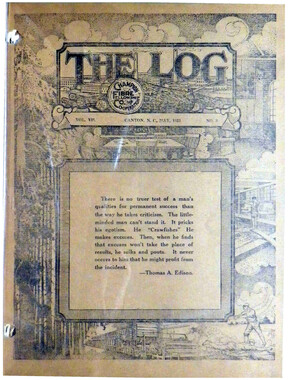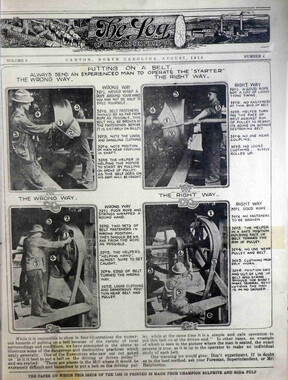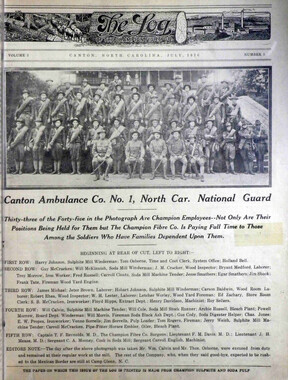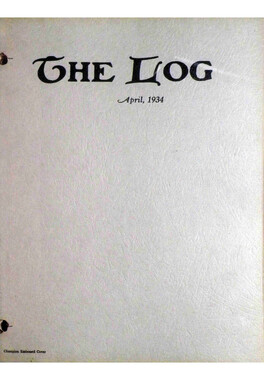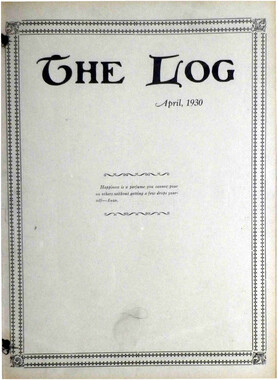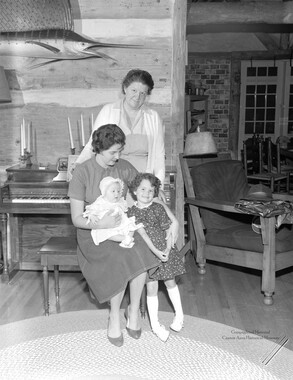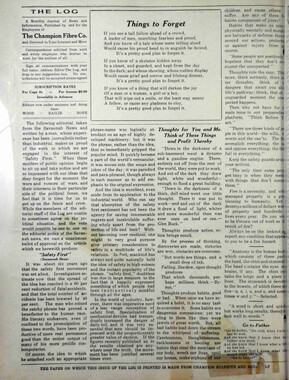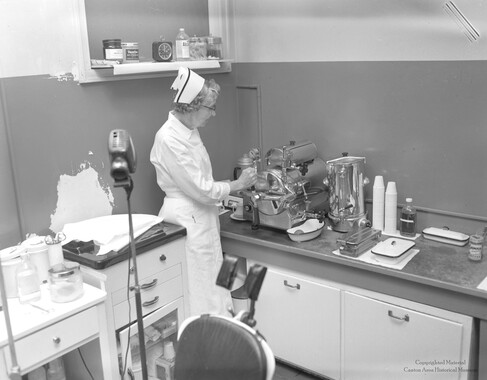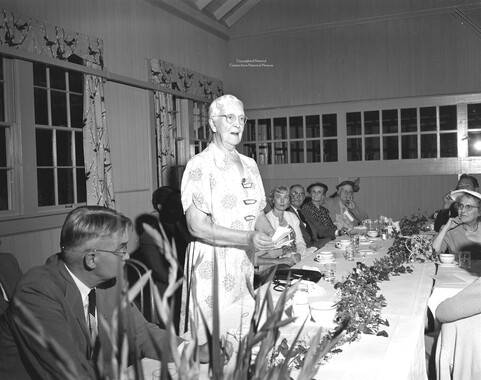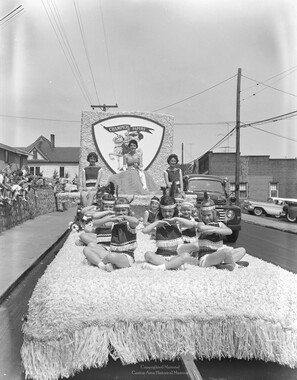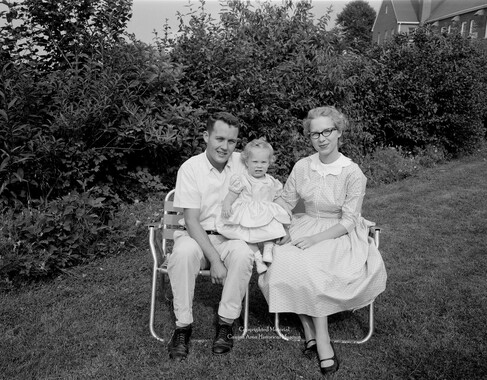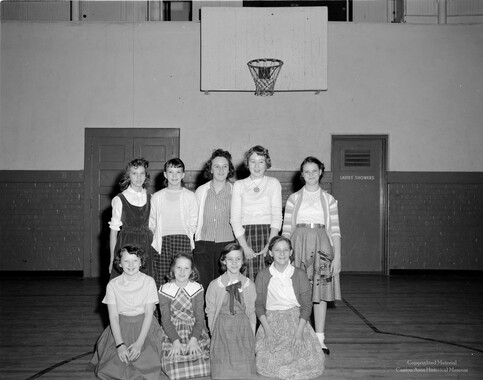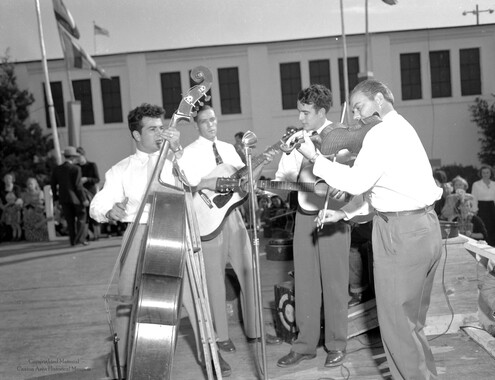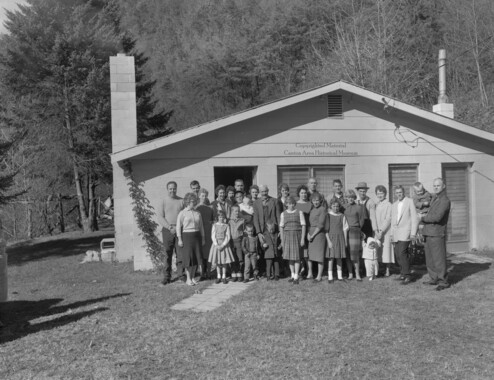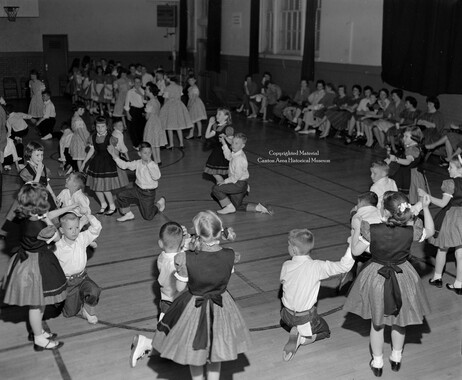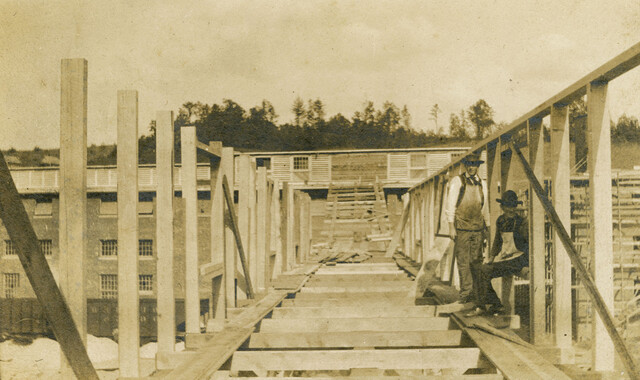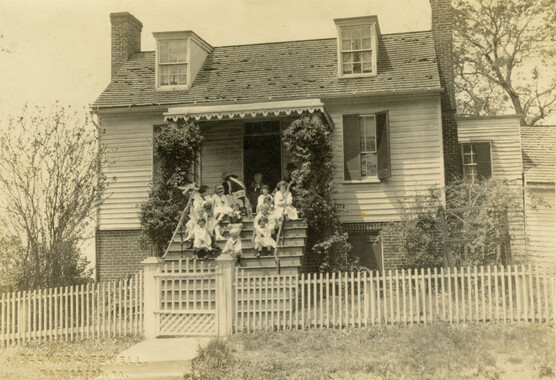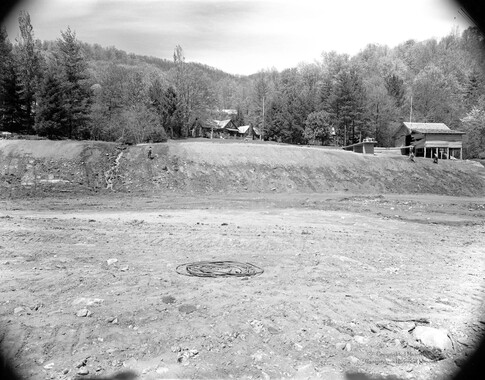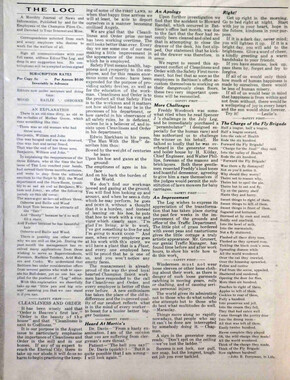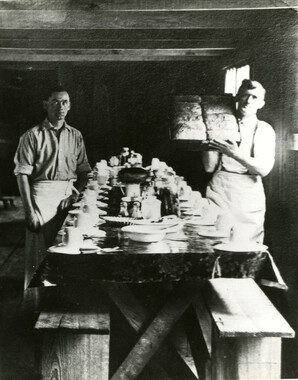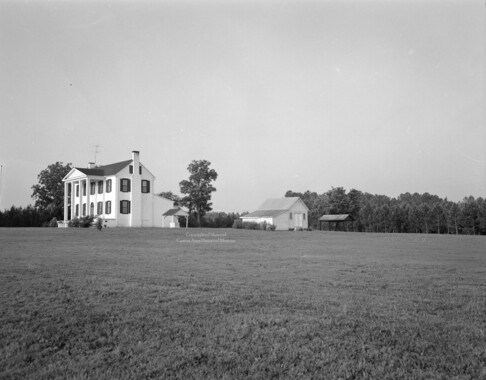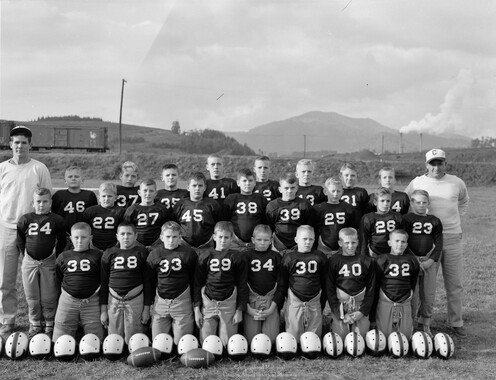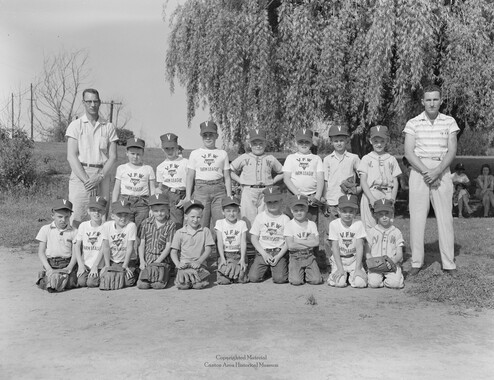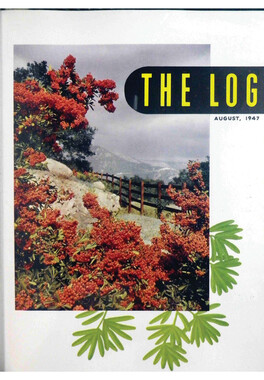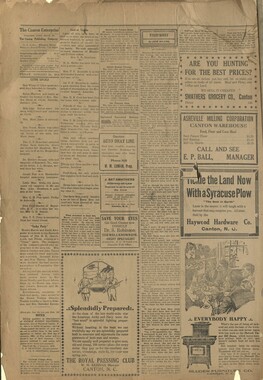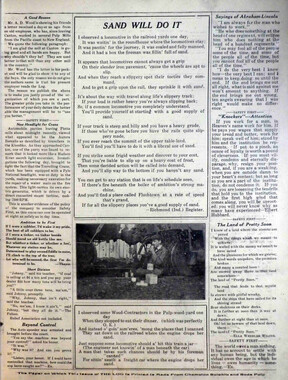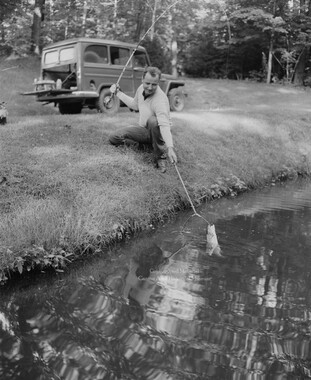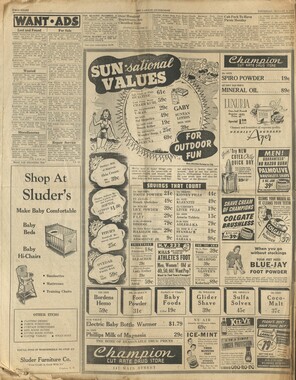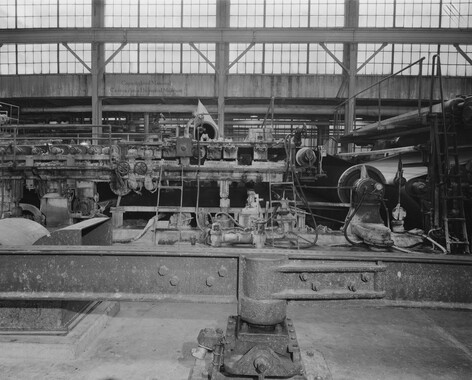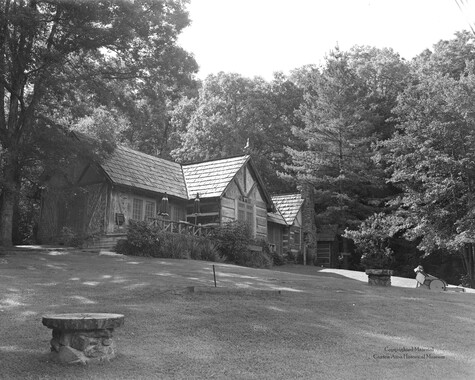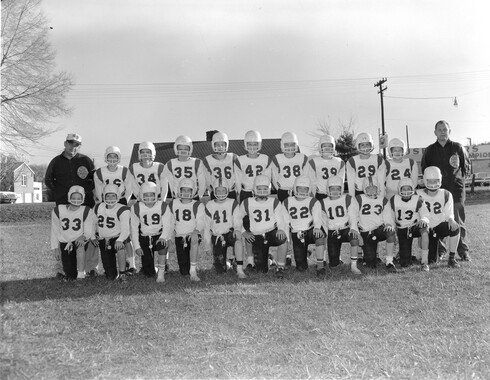Western Carolina University (20)
View all
- Canton Champion Fibre Company (2308)
- Cherokee Traditions (291)
- Civil War in Southern Appalachia (165)
- Craft Revival (1942)
- Great Smoky Mountains - A Park for America (2946)
- Highlights from Western Carolina University (430)
- Horace Kephart (941)
- Journeys Through Jackson (159)
- LGBTQIA+ Archive of Jackson County (85)
- Oral Histories of Western North Carolina (314)
- Picturing Appalachia (6873)
- Stories of Mountain Folk (413)
- Travel Western North Carolina (160)
- Western Carolina University Fine Art Museum Vitreograph Collection (129)
- Western Carolina University Herbarium (92)
- Western Carolina University: Making Memories (738)
- Western Carolina University Publications (2491)
- Western Carolina University Restricted Electronic Theses and Dissertations (146)
- Western North Carolina Regional Maps (71)
- World War II in Southern Appalachia (131)
University of North Carolina Asheville (6)
View all
- Allanstand Cottage Industries (62)
- Appalachian National Park Association (53)
- Bennett, Kelly, 1890-1974 (1463)
- Berry, Walter (76)
- Brasstown Carvers (40)
- Carver, George Washington, 1864?-1943 (26)
- Cathey, Joseph, 1803-1874 (1)
- Champion Fibre Company (233)
- Champion Paper and Fibre Company (297)
- Cherokee Indian Fair Association (16)
- Cherokee Language Program (22)
- Crowe, Amanda (40)
- Edmonston, Thomas Benton, 1842-1907 (7)
- Ensley, A. L. (Abraham Lincoln), 1865-1948 (275)
- Fromer, Irving Rhodes, 1913-1994 (70)
- George Butz (BFS 1907) (46)
- Goodrich, Frances Louisa (120)
- Grant, George Alexander, 1891-1964 (96)
- Heard, Marian Gladys (60)
- Kephart, Calvin, 1883-1969 (15)
- Kephart, Horace, 1862-1931 (313)
- Kephart, Laura, 1862-1954 (39)
- Laney, Gideon Thomas, 1889-1976 (439)
- Masa, George, 1881-1933 (61)
- McElhinney, William Julian, 1896-1953 (44)
- Niggli, Josephina, 1910-1983 (10)
- North Carolina Park Commission (105)
- Osborne, Kezia Stradley (9)
- Owens, Samuel Robert, 1918-1995 (11)
- Penland Weavers and Potters (36)
- Roberts, Vivienne (15)
- Roth, Albert, 1890-1974 (142)
- Schenck, Carl Alwin, 1868-1955 (1)
- Sherrill's Photography Studio (2565)
- Southern Highland Handicraft Guild (127)
- Southern Highlanders, Inc. (71)
- Stalcup, Jesse Bryson (46)
- Stearns, I. K. (213)
- Thompson, James Edward, 1880-1976 (226)
- United States. Indian Arts and Crafts Board (130)
- USFS (683)
- Vance, Zebulon Baird, 1830-1894 (1)
- Weaver, Zebulon, 1872-1948 (58)
- Western Carolina College (230)
- Western Carolina Teachers College (282)
- Western Carolina University (2008)
- Western Carolina University. Mountain Heritage Center (18)
- Whitman, Walt, 1819-1892 (10)
- Wilburn, Hiram Coleman, 1880-1967 (73)
- Williams, Isadora (3)
- Cain, Doreyl Ammons (0)
- Crittenden, Lorraine (0)
- Rhodes, Judy (0)
- Smith, Edward Clark (0)
- Appalachian Region, Southern (2569)
- Asheville (N.C.) (1923)
- Avery County (N.C.) (26)
- Blount County (Tenn.) (195)
- Buncombe County (N.C.) (1672)
- Cherokee County (N.C.) (283)
- Clay County (N.C.) (555)
- Graham County (N.C.) (236)
- Great Smoky Mountains National Park (N.C. and Tenn.) (519)
- Haywood County (N.C.) (3569)
- Henderson County (N.C.) (70)
- Jackson County (N.C.) (4912)
- Knox County (Tenn.) (35)
- Knoxville (Tenn.) (13)
- Lake Santeetlah (N.C.) (10)
- Macon County (N.C.) (420)
- Madison County (N.C.) (215)
- McDowell County (N.C.) (39)
- Mitchell County (N.C.) (132)
- Polk County (N.C.) (35)
- Qualla Boundary (982)
- Rutherford County (N.C.) (76)
- Swain County (N.C.) (2182)
- Transylvania County (N.C.) (270)
- Watauga County (N.C.) (12)
- Waynesville (N.C.) (86)
- Yancey County (N.C.) (72)
- Aerial Photographs (3)
- Aerial Views (60)
- Albums (books) (4)
- Articles (1)
- Artifacts (object Genre) (228)
- Bibliographies (1)
- Biography (general Genre) (2)
- Cards (information Artifacts) (38)
- Clippings (information Artifacts) (191)
- Copybooks (instructional Materials) (3)
- Crafts (art Genres) (622)
- Depictions (visual Works) (21)
- Design Drawings (1)
- Drawings (visual Works) (185)
- Envelopes (73)
- Exhibitions (events) (1)
- Facsimiles (reproductions) (1)
- Fiction (general Genre) (4)
- Financial Records (12)
- Fliers (printed Matter) (67)
- Glass Plate Negatives (381)
- Guidebooks (2)
- Internegatives (10)
- Interviews (815)
- Land Surveys (102)
- Letters (correspondence) (1013)
- Manuscripts (documents) (618)
- Maps (documents) (177)
- Memorandums (25)
- Minutes (administrative Records) (59)
- Negatives (photographs) (6090)
- Newsletters (1290)
- Newspapers (2)
- Notebooks (8)
- Occupation Currency (1)
- Paintings (visual Works) (1)
- Pen And Ink Drawings (1)
- Periodicals (193)
- Personal Narratives (10)
- Photographs (12976)
- Plans (maps) (1)
- Poetry (5)
- Portraits (4568)
- Postcards (329)
- Programs (documents) (181)
- Publications (documents) (2443)
- Questionnaires (65)
- Relief Prints (26)
- Sayings (literary Genre) (1)
- Scrapbooks (282)
- Sheet Music (2)
- Slides (photographs) (402)
- Songs (musical Compositions) (2)
- Sound Recordings (796)
- Specimens (92)
- Speeches (documents) (18)
- Tintypes (photographs) (8)
- Transcripts (322)
- Video Recordings (physical Artifacts) (23)
- Text Messages (0)
- A.L. Ensley Collection (275)
- Appalachian Industrial School Records (7)
- Appalachian National Park Association Records (336)
- Axley-Meroney Collection (2)
- Bayard Wootten Photograph Collection (20)
- Bethel Rural Community Organization Collection (7)
- Blumer Collection (5)
- C.W. Slagle Collection (20)
- Canton Area Historical Museum (2110)
- Carlos C. Campbell Collection (462)
- Cataloochee History Project (64)
- Cherokee Studies Collection (4)
- Daisy Dame Photograph Album (5)
- Daniel Boone VI Collection (1)
- Doris Ulmann Photograph Collection (112)
- Elizabeth H. Lasley Collection (1)
- Elizabeth Woolworth Szold Fleharty Collection (4)
- Frank Fry Collection (95)
- George Masa Collection (173)
- Gideon Laney Collection (452)
- Hazel Scarborough Collection (2)
- Hiram C. Wilburn Papers (28)
- Historic Photographs Collection (236)
- Horace Kephart Collection (861)
- Humbard Collection (33)
- Hunter and Weaver Families Collection (1)
- I. D. Blumenthal Collection (4)
- Isadora Williams Collection (4)
- Jesse Bryson Stalcup Collection (47)
- Jim Thompson Collection (224)
- John B. Battle Collection (7)
- John C. Campbell Folk School Records (80)
- John Parris Collection (6)
- Judaculla Rock project (2)
- Kelly Bennett Collection (1482)
- Love Family Papers (11)
- Major Wiley Parris Civil War Letters (3)
- Map Collection (12)
- McFee-Misemer Civil War Letters (34)
- Mountain Heritage Center Collection (4)
- Norburn - Robertson - Thomson Families Collection (44)
- Pauline Hood Collection (7)
- Pre-Guild Collection (2)
- Qualla Arts and Crafts Mutual Collection (12)
- R.A. Romanes Collection (681)
- Rosser H. Taylor Collection (1)
- Samuel Robert Owens Collection (94)
- Sara Madison Collection (144)
- Sherrill Studio Photo Collection (2558)
- Smoky Mountains Hiking Club Collection (616)
- Stories of Mountain Folk - Radio Programs (374)
- The Reporter, Western Carolina University (510)
- Venoy and Elizabeth Reed Collection (16)
- WCU Gender and Sexuality Oral History Project (32)
- WCU Mountain Heritage Center Oral Histories (25)
- WCU Oral History Collection - Mountain People, Mountain Lives (71)
- WCU Students Newspapers Collection (1923)
- Western North Carolina Tomorrow Black Oral History Project (69)
- William Williams Stringfield Collection (2)
- Zebulon Weaver Collection (109)
- African Americans (390)
- Appalachian Trail (35)
- Artisans (521)
- Cherokee art (84)
- Cherokee artists -- North Carolina (10)
- Cherokee language (21)
- Cherokee pottery (101)
- Cherokee women (208)
- Church buildings (189)
- Civilian Conservation Corps (U.S.) (111)
- College student newspapers and periodicals (2012)
- Dams (107)
- Dance (1023)
- Education (222)
- Floods (61)
- Folk music (1015)
- Forced removal, 1813-1903 (2)
- Forest conservation (220)
- Forests and forestry (1184)
- Gender nonconformity (4)
- Great Smoky Mountains National Park (N.C. and Tenn.) (181)
- Hunting (45)
- Landscape photography (25)
- Logging (119)
- Maps (83)
- Mines and mineral resources (8)
- North Carolina -- Maps (18)
- Paper industry (38)
- Postcards (255)
- Pottery (135)
- Railroad trains (72)
- Rural electrification -- North Carolina, Western (3)
- School integration -- Southern States (2)
- Segregation -- North Carolina, Western (5)
- Slavery (5)
- Sports (452)
- Storytelling (243)
- Waterfalls -- Great Smoky Mountains (N.C. and Tenn.) (66)
- Weaving -- Appalachian Region, Southern (280)
- Wood-carving -- Appalachian Region, Southern (328)
- World War, 1939-1945 (173)
The Log Vol. 9 No. 01
-
Between 1914 and the late 1960s, the Champion Fibre Company published an internal newsletter, called The Log, to share news about the Canton mill, the community, and its employees. After 1940, news from the entire “Champion Family,” which included mills in Hamilton, Ohio; Houston, Texas and Sandersville, Georgia, was featured in each issue.
-
-
HE OG = = VOL. IX CANTON, N.C •. MARCH, 1926 Our Motto: ''Safety--- Cleanliness---Efficiency'' Bird's eye view of timberlnnd owned b) The Champion Fibre Company HEN thm~s first got to goln' \Honr with me, I says: "0 Lord, whntevrr e<>m"s, keep me from gitin' sour!'' Since then I've made it a practice to put all my worrirll down in thl.' bottom (){ my heart, then set on the lid nn' ::mile. -Mr!!. Wiggs. NO.1 I I .. lf7tse M en Sometr.mes Act Foolishly President Lincoln was repeatedly warned by his f riends of impending danger, but he refused to heed. On one occasion he said "that he could not possibly guard against all danger unless he were to shut himself up in an ice box." Ward Lamon, marshal of the District of Columbia, two days before the assassination of Lincoln, urged him not to go out at night, especially to the theatre. Lincoln turned to Mr. Usher, the Secretary of the Interior, who was present, and said, ''This man Lamon is a monomaniac on the subject of my safety. He thinks I shall be killed, and we think he is going crazy." Two days later he was murdered in the very theatre Mr. Lamon had warned him not to attend. Every man on this job has been warned of the danger of getting hurt while on the job and urged to be carefuL But, like President Lincoln, many of them refuse to heed the warning- t hink we are "crazy" on the subjC('t of their per sonal safety, continue to take chances and pay for their folly with suffering. If we ar e wise we will profit by past mistakr- and play safe in the future. VOL. IX. MARCH, 1926 TO THE MEMBERS OF THE S. E. DIVISION OF THE PULP AND PAPER MILL SUPERINTENDENTS ASSOCIATION: It is with pleasure that I extend to you a hearty welcome to the Canton Mills. I sincerely hope that your visit will be pleasant and interesting for you. I regret that my engagements will not permit me to be with you on this occasion so that I could meet you all in person, but I am sure that my Associates will do their best to make your visit a pleasant one. I am availing myself of the pages of our plant magazine "THE LOG" to extend my personal greetings to you all and to express the hope that you may have an enjoyable and profitable meeting. Yours sincerely, THE CHAMPION FIBRE COMPANY, ~~.~~ March 27th, 1926. President. NO.1 .•.). THE LO<; LINCOLN THE 16TH PRESIDENT OF THE UNITED STATES On }o'ebruary J2tll, 1809, AbrnlHlm Lincoln, t!te Emancipat-or, was born nt Nolin'!! Creek, near Ilodgensville, in Hardin, now La.ru County, Kentucky. Durine: the same year Gladstonl', 'fennyson and a number Cl{ oth<'l' illustrious men snw the light, but none of thl.'m merit!! a higher place in the history of the world, and in the arfc<'liOllS o{ the An1crican people, than this poor struggling boy born in a log cabin in the wilderness of Ken tuck~•. As no other ,'J1rul perhaps, Lincoln shares with George Washington the distinctiOn of $upreme fame in Amel'ican history. He is not judged solely by his public acts, {or in moral h2ight as well as in human ~ervice ho measurl.'s up to the immortals in all ages. His simple. goodness-his honesty, courage, kindness, duty and love £or humanity marked him ns one of the greatest of men. Abraham Lincoln's grandfather was also named Abraham. He removed from Virginia to Kentucky during the pioneer era and was a comrade of his brother-in-law Daniel Boone. There be was killed by the Indians. He left a SOQ. Thomas, who, married Nancy Hanks, a woman of Virginia parentage, she also belonged to a poor nnd humble family. The tog-eabin, with its dirt floor, in which he was born, was perhaps, bot a grade better than an Indian home. At. six and seven years of age he went for a short time to a backwoods school, where his Qnly text-book was a second-hand copy of " Dillworth's Spelling Book.'' Be learned little more thnn to read and write. At the age of eight his parents removed to Little Pigeon Creek, near Gentryville, in Spencer County, Indiana. His father's little Jog cabin of two rooms was located in the woods several miles from any other human habitation. There was no school within many miles, but hls mother of fine mind and pious soul taught him what aile could, and added to his lessons the simple religious tt·aining that marked all his a{tcr life. Two years after their removal to [ndiana she died and Abrohom was left to the companionship of his hard working father, who was a cabinet;..maker by tra<hr. It is sold that Ab.rah11m, at. lhe age af nine, helped his father mnke the coffin In which_hi!! mother was buried- A year later the falher married again, his second wife beinr a widow, Mrs. Sorab J ohnson of Kentucky. She proved to be a good mother to Abraham, encouraged him to atudy, love God and k~>t•p his Commandmentll. About two years later one of the neighbors opened a 11choot in his own cabin, nnd the young mton nttended it for 11ome time. There be atudied arithmetic and other primary branches. He abo read a number of books which profoundly influenced his mind for life. ThellC were tho B1ble, Uunyan'e Pilgrim'11 Prog-restl," Aesop's Fable.., and tbe ltle of Washington. l!lf,l ISM Buuks w .. re carc< tn that co•Jnl•} dur.ng tl ost day !mt ~~.h a he could get hold m' Wt re read una rc-road mony till"' . At the age of tw<'nl} .one Lmcoln poi! ··~sed :;ix book~ "The Btble, Pilgrim's Progr«'s , Acsop'11 Fables, The Arnb1.nn NiKh~ A Ui~ of Wasbington and the Statutes 11£ Indiana." F'rom a~.:emg !< tew copi('!' of n Louisville newspapet· hP. hnd cnmmith•d u ncmb• r ot Henry Clay's speeches to memory. In the year L830 h1s father r<>-m(Wt d In Decatur, 1'!... un the Sangamon river. It wall on this river that he built a flat-boat. and navigated it. When the Black Hawk Indian w:u broke out in 1830 he enli ted in the army and was made a captain of volunt.et.r;:;. After the war he settled at New Salem on tne Sangamon river and became a grocer , sut'\>eyor and postmastcr. During his spare t.ime he studied law, and in 1834 he wa..~ clio!en by the people of his district to repre54!nt them in the legisl:~ture. Self educated he passed the examination for admis!lion to the bo.r in 1837. In 1839 when Springfield became the Capitol of Illinois. he removed to that city and opened a lnw office. His partner was John T. Stuart, and ths firm soon became weU known_ Lincoln's reputation as a lawye.r especially, in both civil and criminal cases. Wft~ now established. In 1840 he was urged to accept a nomination for the l~islatur<!. but declined. He was fast outgrowing State politics, and aspired to a place in National aft'ai~:s. In 1846 his ambition was gratified iu his election as a representative in Congress. His Cont,rressional term of office lasted from 1847 to 1849 and during thAt rune he was actively interested in N~tional politics. He was a mem~r oi the National Whig Convention which nominato;-d G<!rternl Taylor for the Presidency, in 1848, and he canvAS!Ied nlinois upon the stump in favor of Taylor's election. The !ollo";ng year he ""aS a candidnte for the United States S<>natorship from fllinois hu~ WkS dc.feoted. At the expiration of hill tern\ in Congress, he r~tired for a tim from politics and devoted biolself to the practice of h1 profession. but held hirusel! in inshmt r.andine:~!l to re-enter th& aN>na whenever opportu11ity shovld S•'Om favorable. The opportun·ity came in 185-1, the Y<'llr which marked t~ turn in&' point in American politics. He pNntpt1y rl'COfmizeJ his I>Pportunity, clost•tl his law books, nnd threw biruS('lr into the Corefront of the political dght. 'l'lle Wb1g r>nrty was rnpidly IJOing to p1e.:<~s anr.l upon i~s ruin the Republican part)' wn~ founded. The lir•t ~utiono.l Con,"\:ntion of t'he New party was ht•ld in tho ~~al' 1 '5\J. , Lincoln aoun becnmu lh1' h~ndt'l: of the opposition in th~ We In tht' 1\nt National Cl)nvcmtion of the RellUblicans his nome prt' .. cntl'd b)• the nliMia d~ll'~lt,,n tL~< it4 \'llndidAt1! fl)r tl\ Yi pl'('aid<>ncy. ln lSI>$ hi11 rame was gi\'en national acQllt! by 01 LIMoln-Douglaa d.-batl'll and ft&'ht for the United States Senaklr •h lp. THE LOG 3 In his speech in the Republican state convention that summer he made this statement which set the Nation to thinking: "A house divided against itself cannot stand. I believe this government cannot remain permanently half slave and half free." In May 1860 when the Republican National Convention met in Chicago, Lincoln was unanimously nominated for the presidency. On November 6th the election occurred and Abraham Lincoln was elected President of the United States. On March 4th he was inaugurated President of the United States of America. And it is said that he was the real head of the government, dom'nnting with his marvelous personality ev<'ry department of it, and with his unfailing tact and sound common sense harmonizing differences and smoothing down difficulties which might have wrecked the administration of any other man. Soon after Lincoln's inauguration the four years' Civil war was begun. In the fall of 1864 Lincoln w11:; re-elected President, by a good majority of the popular vote and by an overwhelming majority of the electoral college. On :March <ith, 1865, he was inaugurated for his second term, and on that occasion delivered what is considered, as not only the greatest address of his own career but perhaps the greatest ever utt<'red by mortal man. After this the end soon came, and on April 14 the fourth anniversary of the day which had witnessed the raising of the Confederate flag over Fort Sumpter, an assin, John Wilkes Booth, entered the box in which be sat in Ford's Theatre in the city of Washington and shot him through the brain. Before morninp: he was dead. Thus the life of Lincoln, perhaps America's greale!$t President, passed on and the nation was plunged into such mourning as it never bef~re had known. On May 4th, he was burried at Springfield Ohio, where "The dust of the Great Emancipator was eonfined to the dust from whence it sprung, while the spirit had returned to God who gave it." A noble monument marks his resting place. On the 100th anniversary of his birth, Feb. 12, 1909, the Lin~oln Farm Association dedicated a memorial 1\!useum erected at a cost of $250,000 on the site of his birth. The log cabin in which he was born is pr eserved in a marble temple. It has been said, that the world has never seen a greater example of wisdom, patience, patriotism and moral courage than animated his every act. He had the brain of a sage, the foresight of a prophet, the inflexible purpose of the historic reformer and the tender heart of a mother." He was a firm believer in God and the old book, the Bible, which he loved to quote in his speeches. WHO AND HOW (By W. R. Crute). "Dig here! Dig here! All the time for nothin'l" said one of the men in disgust, so the gang threw their shovels down. They couldn't see the sense in digging first one .place and then anot~er with no results. Then their foreman e:xplamed that he was trymg to find a water pipe. There was p urpose in ~hat, and every m.an promptly went back to work. Is your gang JUSt digging, or d•g· ging with a purpose? Do Superintendents and foremen ever consider that probably it's h ir fault that men go at their work half heartedly, that lhey loaf ~und whenever they can and long for the time when they can go orne 7 Do the bosses take any blame for the lack of interest of the men? Row can interest in work be ar oused 1 A football player in a hard game will exert himself more in one hour of play than many of us do in a half day's work. No one pays him or makes him work. The driving force in the game is lhe desire to excel his opponents. If we can mnke a game or our work we "ill like it, but how Cl\n we make n game of our work? That's not so difficult, most of our bosses have had enough experience to know how long it should take a man to complete the majority of the jobs we have; why not make lhe object of the game to beat the record of the last fellow on the job'! In last months' "LOG'' there was an account of the masons crew building a smelter in record time; n day or lwo ago, I was informed that the roofing boards on the new pot house were laid for $12.00 perM; that the ~ttack was put up in one day, that the concrete gang poured t he beams and columns at a cost of 93 cents per cu. yd. and sev.ral other crews in the plant made equally good records. These foremen and men w<>re making n game of their work; they were trying to make a reco1·d, trying to bring the unit cost or their work down. Do you know whether your unit cost is higheJ' this month than last? Why not begin thinking in unit cost? There are a lot of different ideas on hCiw to handle men, i~ is told of the late Stephen Girard of Philadelphia, a man who made a success of life, and did much for the city of Philadelphia, that rather than see his men idle, he would make them carry bricks from one side of the street to the other side and pile them up, then immediately make them take the same bricks back to the original location and pile them up again. Doing useless work is to lhis day referred to as "Stephen Girard stuff," around Philadelphia. I personally do not approve of l\1r. Girard's methods, if a crew have completed their work and there is no more useful work to assign them, why not let them take it a little easy? They will probably put more "pep" in their work the next day, since they know the purpose is to finish the work, incidentally reducing the unit cost. Where it is feasible, setting a given task as a day's work is a good system. I once worked with a yard foreman, Henry D. , who was about six feet four inches tall and built in proportion; he was in charge o! the unloading of coal into the bunker. Henry left orders with the man doing this work to leave one end of the bunker empty; the man did not get the instructions clear, and failed to leave the bunker empty. When Henry came in and found the bunker filled, be went a!ter the man in this manner: "John, why didn't you leave that. bunker empty, like I told you?" John replied, "Mr. D. , I thought"-- He did not get any further with his explanation, for Henry was back at him wilh "D--- it! you ain't supposed to think, if you was, you would be gettin' more than a dollar and a quarter a day." Now that is another man's idea of how to handle men, but no one here approves of this method. Instructions must be carried out, but unless we can get our men to use their heads for something more than "hat racks" we are failures as leaders. It is part of every man's nature to want to be doing something worth while, to feel that he is doing useful work and getting somewhere, :and to feel that he is doing his work better than others are doing like work. Who is going to cultivate this side of his nature and how? Will not showing him the purpol'e of his job; getting him to make a game of his work, getting him to think in unit cost, setting a time for a given task and getting him to use his head bring out the best that's in him? "Let us have faith lhat right makes might; and in that faith let us dare to do our duty as we understand it."-Abraham Lincola 4 THE LOG H \ SKET H \ 1 ~1 . \ OLLF.Y K \ Ll. 1"001' lULL H ~\ 0 llALJ, lURE H\LL TJOWLJN(; .. \ . lt . Hit()\ ~. l'h\'~1('111 IJirt>rt•11 CANTON llJGH St llOOL GfRL-"i WIN ('H \MP101'. :-\llll' Tlw undefcntNI PU!·pl(• llurricnu.·~ oi Cnnt(ln ll igh School wnu the Chnmpion~<hip of W<''lt~rn Nt~rth Cnrolinn and ~r~·our number .1 nml 1('1. ()n thE' Wnynes,·illc• Righ ~chool r()urt, We<in(•lldn~· ni$th1, ..,... .,...1\!llrch 10, befon• 1.1 crowd t\f "''er 300 !<ped~tlor~. 200 of which wrr•· f rom Canton. Th:: scor<> wn:< 21 tn 5. A full at·c(lunl <>f th(• ~t\lllC could nl\t b" got ten up for thit1 i~<Rue of the Log. \'!' will AAY, howe,·cr. thnt the C:mlon High Sch~u)J girls plnycJ the bcl<t ,:tame of the season. Price led her tet1m's attack· whil~ tho excdlcnt gu:~~:di n g of Perr~·. Pless and Sct·o~r~t:< was too mul'h for th Ashc\•1lle SextPtte. Their J,!uarding ft-alu1·ed the pme. H. W. Park.-, of Greensboro, N. C. rcft-rc('d lh(> ~tame nnd handler! it perfectly. The Hol"rican<' has challeng-ed &evernl teams (If the &late for :: ~tate chnmpi.:m.Jltip game but just what the nutcome will be i!; not l."llown. CHAMPJON ''Y" HAS STRONG CAGE TEAl\1 'lmJ HE Champion Y. l\I. C. A. battketb:lll leam hus completed I 1926 :,chedole with seven victories nnd seven losses to I . tnc~r credit. The team, und<!t' the coaching o{ W. R. Brown, physical director of the Y .. has ac!quired :1 wide r ep\ltlttion as one of the cleanes t and fast e..<t quints in W. N. C. Olson's Terrible S\·cdcs met ";th much opposilton when th('y met. the Champion Y. on .JanuAry 2, which gam<.' was thr first pro· fessional game ever pln}•rd in the state. The 'Y. M. C. A. pro fited greatly by lhe gnme~ with the Swedes. Sorrells, who 1'- star fr,rward of the Y. tcum, has been a member of that quint since their first team was orgoni?:cd iu J!l20. "Lefty," as he is called, il< a fast working forward and hAS led his team in scorin~ this season as W<'ll OF lwing captain of the. squad. Price>, who plny<'d forwnrd for tht· C'ant.<m High ;SchOCII t<>um la ~t year, is a swift moving and accurnt1• play<!r. 'Hi!! WOl'k with th•· Y. team ·this seru>r..n ha~; prov4'!n him an outstanding m<'mber of the squad. Cook, the SI.X-fOCit. thl'('(l inch ('(•nlor. Ill ch\~Mld Ill o n~ or tho mo11t able pivot men rn lhl' ~w. Cook is death em the· ltp nfr nnd his great height ndds mucl1 t.o his nhiltty tl> :<cOtl'. Kef:ncr and WP~tmorrlflncl, who makl' up Co11ch 8town'11 deflllthl', are old playL·r ll and r•lay thPir poslLirmq well. Hath nwn are ftOOII shots nnd Rwift floorwork makes them th~> nH1inst11y of thP \ . cnurt machine We~tmort!land covt•r ll the huckboorcl wt'll while· K~cne:r', court work has Ccnturerl st·v~>rn l ~tnmc·~>. Sc:roJ:'g• und Morgan ma111 up the eecond forwarda with .Telf nncl Robinllon o1Let1'1ullllg nl e..-u t.er while nardin und Runtrtte hc.ld guard JWBiti(JnH. They hOYt' clos.-d thl' mo t auecessftll t•a!IOn in the hi11tory of the in tituhon Th<' Champion Y. team, all a whol~>, i• a fa!lt moving nnd lll'Cur ate quintet. Y. :\1. l ' • . \ ., IIJ(,JI S('fi()OL AND T()W~ \TJIL£TI< .' 0\t "' :l) '' pllt}' fnrwnrlil Alt•·rn.l!ing "'ith J•rrte, "'h n nee nry. ( h "' n 1• on old pin) t·r Lik" ~<•rr4'11·. n~ j<,tnNl th,. Y tnu.m in th<'tr fir~t )"llllr anrl hns b<'Cn mukinl( l(<tod ••vtr &lOC" )li;r .-!,.an, c<>ol-hcndcd playmg hM won for hun a hll(h plrt(<· nn tht' l"'am. WARE POREST DOWN~ Y. ~- (;. A. 'ff(,£fll . HE Wake For<'•t F'r:!shmen t~XJk .11h·antn"'"' Qf , k' re. moval, in the la!tl thre( minull' .,( pby, in the sran '! hel"C Wedn e~day night, F•·b1"u1~1 ?1, anrl rallied t() defeat th11 Chaml)ion Y. bn :~ketball t ·nm, 30 LQ 27. With the score standing 27 lo 27, a costly error whit'h rP:<nlted in the removal or Cook, Canton centtr, caused C'anton't~. drien•e tt• weaken, allowing the collegians to rally and ~<core thre<· la!<t minut" points, a foul shot by Cartl'l· and a fldd goal by Doutin, eapl.3in nr the Freshmen. Doutin's brilliant field work wn~ the feature of the !fame, wh1le the W<>rk of Sorrells, Canton forwurd, v.·a::. ootstandinJI'. Sorrell:o led Canton's attack. caging shots frotn aU angles of the C()urt a!! well as swift And accurate floor work. The close gunTdintr of Keener and \Vestmoreland gave the FTeshmen much oppo5ltlon. The game with Wake Forest was one of the best games of the senson and ranks next to the game with the Terrible Swedes m speed und court work. Thi~ was the Freshmen's first ,;<lit ~o Canton. Losing the game to Wake Forest gave the Champion Y. Tiger:! an even break in lh.e (ouJ·t.eeu games played so (R.r thi~ season, haYing won 7 and lost 7. lt will be interesting lo know that the Wake Fnre:.t Fn•,.hme.n made n clean sweep of the Western N. C. series. TheY pJayt'd :;ix games and lost none. Their schedule inclucltd $tnm •. ,. with 1h Candler High School. Asheville H i, Cl1ampion Y .. :\tar ... H1ll, A"h \' illf: Athletic Association, and Swannanoa Hi. C n \MJ>lON "\'" MTJ)CETR WIN F'BOlll KTXI~ H.nl PUP The Cha:mpion Y. M. C. A. Midg~ts . onder the Ct'u\'hinc oi \Y. R. Drown, have developed into one of the !'m<\llt·~t and fa~t<'~t tellm.., ever organized in Cnnt.on. The team Is composed or .Junit>l" b•l~·s who> will iu tim~ be the stars of the <'nnton lligh School and Y. ~1. C. A. team$. Three gnmt>s hrwe been played and won b~ Olb- midg~t t~ m 'l'hc first game was with the A~h!'\ lllco Chum:-. \1 ht•n th• v handl.'d thnl t<•nm n 27 to 25 enging • ThE' Midg11t!l mnd(' it l wo !rom c h,, Binl{hnm Pups "hl'n tlt~~ dt'!featcd the Junwr •ld(>tR lfi h• 11 t ~ •nehaJU nd , ain 19 to 18 at Canton. The line up and .-ublltilut, ~ l'l thv Midgi'h llr<'· Name Harktn. A. Cl'OifiS R.hiMhl\l'l F. Smathers Hill Po-ition F F c G ~Uhl<lltU~-Cruml('y, ow ... n, Willi, ~het'l\.-.111, Ro~rts worth. G nd THE LOG BU!=;T OF PETER G. THOMSON, SR. A bronze bust of 1\Ir. Peter G. Thompson, Sr., was recently placed in the lobby of the Champion "Y." Mr. Thomson is one of the pioneer coated paper manufacturers President of The Champion Coated Paper Company, Hamilton, Ohio; nlso organized The Champion Fibre Company and was its first President. He is a great lover of sports and in his young days was quite an athlete. The Chnmpion "Y" is a product. o! Mr. Thomson's generosity. Y. M. C. A. GYl\1 CLASSES Physical Director Brown of the Y. M. C. A. announces the following classc~ that are being held for the benefit of members of the Y, and urges everyone who poss•bly can to get in one or the other of these clns<~es. He is always ready to help you if you will give him a try. WORKING MEN'S CLASS The main gym class on the physical director's program is that of the working men or mill men. This clat!s meets on Monday and Thursday nights at 7:30 o'clock. Twenty men are now enjo}ing · class and it is still growing. Every man is urged to atund. 'a make the enrollment number 500 at the next class. e evening program of this claas is composed of-a warm-up setting up exercises, work on operators, work on mats, gym ga~ea, volley ball, indoor base ball, pyramid building, tumbling and boxing. GIRLS' CL.\SSES Beginning Tuesday, )larch 16, the working girls and office girls clns.~c~ will resume their work on the gym and in the &\imming pool. The lire broke up thi~ cln!l~ but everything has been repalrl.'d nml the director urges a full nltendunce. BUSI.S El-iS ~IE:'-i'S CLASS On Monday, Tuesday and Friday evening,. from 5 to G o'clock the Busine:<s men'~ Gym clnss i~ tho same as that of the working men'$ cia~~. BOOK ·:\1lr.r, GJRI:S CLASS At 6 o'clock on Tue~day and Thursday afternoon tho swimming class for the girls of the Book Mill are to be held. INDOOR B .\ ~Ell \I,L LEAGLE Plana are under way to Cll'gnnir.t· on :\1'onday and Thursday nights, immediately following the working men'" gym class an indoor baseball league co'tlposed of 4 tc.•nms. H,\.SI> B \1.1, TOUit~A~tE:>\T All men who are interestNI m a hand ball tournamtnt to begin the last week in March nrc asked to sign up at once. This tournament will be for both singles and doubles. BASEU \LL LEAGUE Th~ town of Canton hns be!'n invited into a four-U>nm league, composed of Canton, 11 ·ndl'l'l!onville, Brevard and Waynesville. This league will be called the Cm·olinn League. Should it be Cormed the Champion Y. M. C. A. will have charge or tho Canton tcnm. Good ba~eball can be had in Canton if the people will only back it.Talk it up and if you have any criticbm to make tell us.' Y. l\1. C. A. DRIVE SUCCESSFUL 1413 Membel'l! Secured During l\Iemlwrship Drhe Which Ended )fonday. (By L. I. H.} The Champion Y. :M. C. A. membership drive ended Monday night, February 15, at 7:00 o'clock, aft£>r one week's intensive work to secure 1500 members. The member:;hip of this Institution now stand~ at 1.143, which ahows an increase of 100 per cent since the drive started. Only GSO members were on the list before the drive and since that time 650 new members have been added as well as 100 renewals, which shows that some fine work has been done by the 90 workers who took plU't in the campaign. The Champion Y. M. C. A,now !!land, forth as one of the strongest institutions of itR kind in the cnt1re South, if not. in the whole country when compared with tlw population of thl.' town. Tho officials of the Champion Y. set 1500 members as their goal when the drive opened, but. nrc well plca!led with the results, as 1500 members was an immense undertaking. 1385 men are on the payroll or the Champion Fibre Company and with the membership of the "Y" numbering 1 143, shows that over two-thirds of the employees of the Company and their families are members of the Y .. for onlr a few members nrc not in some \'IY connected with the Company. The officials of the Champion Y. take this opportunity to thank all those who took part in the drive Cor 1500 members for their aplendid work during the campaign and urge them to continue to make the Y. a dominnting influence in the mill and community, 6 THE LOG Publiahed by "The Champion Family" as a Symbol of the Co-opecation and Good Fellowship Existing ttl the Plont of the Champion Fibre Company. Cont.on, North Carolina. Editors now under sentence and doing time, WOOD GRIF FITH PHILLIPS THE CHAMPION NEWS We have receh•ed the March issue, Volume 1, Numb~ .. 1, of lhe Champion Ne ''~~• the monthly publication of lhe Champion Coated Papt•r Company, Hamilton, Ohio, and hu!!Lcn to congratulate our Champion editors ::~t Hamilton upon the splendU nppear anc2 of their first issue. The front cover bas an 8x8 inch picture of the First Champion " Torker. Mr. Peter G. Thomson, who organized the Champion Cottted Paper Company, in the year 1893, and about lwehc years later organized the Champion Fibre Company. It is a ~plendid picture of Mr. Thomson. On the last. page is a picture of the Champion store ul \he big plant, where g.oods are sold to 2 mplo~•ees only, a d,.set·iption of lhe store and a picture of ''Butch,'' the meat cutter. There are photos of nine employees, men and women, who hove been in the employ of the company for thirty-two years, one of the new supt's of the Coating .Mill, one of the doctors, one of \he chief inspector and of the fourteen members of the editorial $lnff o! lhe News. The middle twa pages are taken up with six view~ ,,f lhc Champion Woodlands in North Carolina. There arc four v!ews of the new Ca!et.er;ia, a picture of t.hc chef nnd of the L\"O nut·su at the plant who were the first din!>rs ait.er the opening of the cafclerin, in J anuary. There is a !inc ~roup photograph or a delettlltion <tf print.ers and paper con11umers of PiLtsburgh, taken on their r ecent visit to t.h2 Hamilton plant. W{' like the spirit of the Champ10n New&, with its picturc :r~ of Champion Workers, Prc~;ident, m<>nt cutter, pnpcr sor ters, doctors and nurses. Thnt.'s tlH~ renl spirit or the orgnnizntion; br inging 11ll the workers tog!'ther. THE AMERICAN PULP AND PAPER MILL SUPERINTENDENTS ASSOCIATlON MEE'r We extend the glad hand of wt•lcom.• to th~· memb<>rs nnd vitlito•·s ire altendnncc· nt. lhe ml!rl.ing of Lhe Sout.henatsrn Division of Pul r t111d Paper Mill Superintendent!~< Assoclntion, which will be held in th"' Champion "Y" Salurdny, Mnrch 27th. The nationnl organization of l.hl• Pulp und PapC1r Mill Swp('rtn tendent's Association includes both the United Sb\teft nnd c~nuda . Th Soutbeaatern Divi~ion embrace!! the Southl'usttrl'l Stale!!, Vir gmln, Tenne11aee, Nor th and South Car olano and Georgia. The Oft'lce-rs ot thl' Southeastern Divi111lon are: Carl 'M&IfliUS, .~111o< rwl .. n•lc11t , bnchull 1·,,,,, r ( omplinj', ~tt>hrr'lt~nd. Vn., mnn, \'le-r-r;h,.tr ntSUI, I J•, hldeurl( C:lli·I"J"·•Lk,. C<lrf•••rati<>n, r,,,_.)' f'n1nt. V1•. J II . Tt.o~l<.· nP, 'I 1,1 \ll'ad( rr,rpt,rnlt••n Kin~•ll f""' r•·nn till I{ ·'- Spr;q J(, '1'1-.1' ( "'"".!'''"' l'thtl ( '•ITtf'lllny, riUII' I . 1'\. r•. '1 h flU~(''> • nf lht c.r~unil.ftlllln unrl lh• dtVl!lll•nnl m~'elin~ll i!!, Ill r•'{C'htm,ll't tel<>:• nn nlltnfii{''ITII!nt •nd t11 l'nNmraur m•1rr· r.ffwet•nl ~·nd ""lis!acl••ry m~>tluul , of 11p•·o 1 11>0 Qmt" n nonnho r nf m'!mh"r mrl Vl"Jtr,r 11r" PJrp~>• t"d lo att•·nrl lht m~cltlll{. Wt <>xt~ntl tto thl'rll n hl'nrty wf'kflme Mltl hr1pc: thnt I hey ''ill like OUT city and st mnny wnrmh"art.NI citiM"n~. PROGRAM 10:00 A. M.· R ~g•lltJ·ntu>n ;end 1nfMmal ml'flting at th~> Champton "Y .. , 10:30 A. ~1. Addr··-.. nr ' \'eknm•· hy Op••ratmg !'up,.r mt.Pnrl~>n l n .. J. 1\(·rr. Rcspon'le by Carl Magnus. 10:40 A. M. Revie" of ChamJ)ion Activities, Operations an Product~. by Roht. W Griffith, :\tAnager of Chern ic.al Sal(•s. I 1 :00 A.M.-Viait to Plant. l :00 P. M.-Lunchet>n (on the prf.'mise:~.) 2:00 P . M.- Moisture tel<ts of pulp. The Champ1on Strip ~etho <>£ Sampling vs. The Disc Method. By H. A. H,.td. e r, Chil'f Ch em1~t. Discussion. 3:30 P. M.-Paper Mill and l\lacbine Rnom Ventilation. B~· ) fr F letcher, Ross Engineering Company. Discussion. 4:00 P. M.- Aut o Ride. 6:00 P . M.- Tnformnl meeting nl Battery Park Hotel. Ashevill~ 6:30 P. M.- Dinner . Speaker: George D. Bearce, E ngineer ~ew8prm Ser ,,icc Bureau. ENTERTAINMENT Boosted by Bill Benzing We know not what our "Bill" will do, But this br ief hin t we give to you: I! on lhc next day you are found )."l)u'll say: " I'm glad T wa:'. a round.'" DIAGNOSIS. WlTHOUT TREATMENT. I WAST'ED ENERG OUR child i>~ !lick ; rou send for your family physician; comes and_ la kes her tcmpernture, count~ her pulse bea and examme~ her carefully. Re is tr-ying to ascena f rom the !lyntptom" the true nature and "eat o£ tro - to discover what ailments nfft•cl h£'r. In other word.s, h,, ui no11cs her cnsc. ~!ter locnting the seal of troublt>, bl' prescribes u tre:\un,•nt. wr1tes out so~e prescr iptions, you tak11 them to tho! drug st~ g~t. _t.he medlcme and for n f~w dnys pt-l·haps, th<J trentm'l!nt 15 l'l'll n 1st6~ed .l'C!l\tlntly and ac(·ording to the physicinn'!> instructic The ch1ld 1mproves, but sh~ IS not ' ' ell, )'OU negl~t to g1ve t reatment nlHi aftl'r 11 while :.h11 i.e< 'J)C:'rhaps in n \Ot'$(> ··onu1 than she ·wuiS nt first. Whose fnult is it, the phy~icinn'~ or r"urs! At the lnst t."o T\•gular ll\Nlthly m.-.•tings of the for\'Dl~ll hov{' bad lively discuu ions on the prl)b\t'm of ·'Wal!t~ PNvcn : ln ~thor " otds, th<> ensc h(l:-. lx-"n thoroughly ''dia~nosed" and ndv1ce t>f thl:' ex}l('rt ,J iagnv~t kmn i::, "tht> desl~d re,.ults , 1• h I • ~ "i.J accomp '' eu 1f N\ch <lne l)f u~o ";11 l"liminat~ wune '" our department." Bot, " ' in the caso of rhc su~k child r<'forred to RbO\'i', ,, e r THE LOG 7 ":1 uctions for only a short while. Then we become carele!ls or neglectful and we find the last condition perhaps worse than the first. Listen! I suspect that every one ol us could, during each day that we are on the job, prevent the waste of !SOme item, such as cost of injuries, waste or stock, coal, power, chemicals, labor, oil, tools, water and material or all kinds. Remember, these thing.; make up the big item of cost in the operation of our plant. and we alone can stop these leaks. While walking over the plant a few days ago, I noticed a third or a harrell of nails setting on the roof or one of thl' buildings, rusting; a batch of about twenty new bolls lying on a platform at lhe entrance to one of the buildings, rusting; a lot of apparently good stock going to the sewer; perfectly good packing goinig to waste: filtered water going to the acwc.>r, c.>lc. These things represent money. Now whose fault. is it.? Don't you think thnt we can p1·event most of this waste by being watchful and careful? When a leak occurs in our department or room and we know about it, let's stop it if we can; if we can't, let's report it to the foreman at once. Let's be just as careful about wasting that which belongs to the Company as we would if it bclongl'd to us. Let's help to remow some of the burden of worry from the shoulders of the General Manager by taking a greater interest in waste prevention. THE BLEACH SETTLING ROOM Have you been in the Bleach settling room lately? The Engineering and Construction departments have made a show room out of one of our most disreputable looking rooms. The room operators are proud of their room and are trying to make it the show room of the plant. Stop in and tell them how nice it looks. FJRE ALARM SIGNALS In case of fire in the plant a warning signal will be blown on siren, followed by signals on mill whistle to indicate location of fire as follows: Wood Room 1 Sulphite MiJJ 2 Jack Pine Chipper 3 Soda Digester 3-1 Book Mill 3-2 Finishing Room Old Machine Room Extract Well . Extract Storage Fibreville Fibreville-Skyland Ave. East Wood Yard West Wood Yard 3-3 3-.t -- 4 4-1 6 . 5-1 G 7 The alarm will also bl.' given on the auto call: First a warning of 10 rapid rings of belJ which will be followed by ringing of signals as above given. blow mill whislll! followed by Siren wilJ indicate fire i~ in ee blows on mill whislle will indicate that. the fire is out. The Siron will be blown at noon on all Saturdays for test pur- GOOD CITIZENS The above picture is that of Mr. and Mrs. G. M. Cagle, Newfound Street. Mr. Cagle has been in the employ of the Company continuoUBiy since June, 1911. J-l(' it, not only a good and faithful employee, but 11 good safe worker. He has been on the job nearly fi!teen years and has lost only two days caused from an injury thnt occurred while on the job. He has worked for as much as three years without losing a single shl.Ct. When Mr. and Mrs. Cagle came to Canton they had only about seven hundred dolJors. But by working regular and spending his money wisely, they have accumulated some good property. At the present time they own four houses, forty acres of lund and have some money in the bonk. All of which he has saved out of his earnings since he has been in the employ of The Champion Fibre Company. An example of what a felJow can do if he wants to and is willing to make some sacrifice!\. Mr. and Mrs. Cagle are splendid good citizens and respected by all o! the people who live in their community. These aru the kind of people that make a good community, town, !\tate and nation. For some time the health of ~1rs. Cagle has not been very go<xl, but we sincerely hope that it will rapidly improve. "I do the very best. I know how· the very best I can; and I mean to keep on doing so until the end. If the end brings me out all right, what is said against me won't amount to anything; if the end brings me out wrong, ten angels swearing I was right would make no difrerenc('." ·Abrnhnm Lincoln. 8 THE LOG \~~----~~=-~-==--~~======-~,~--&---~-==~===---~---~~ PRODUCTION C\_n d__, NOTLWORTl-lY ,., RCCORDS .... ACCOMPLISI-1Mf:N1'S .-- ·- --- Eacl'l tnOnth 't.hla PRJrlf' "'-ill 1"-~ devotN \'1\.(.Unll)• ot who1lr. •• Lb(' 1'eQ\litt1met.n._ .,rut\)• be, to a. R:port. " ' lhc• rt'<:ord t:na.d,. ln t-FfJfJtJ<'I hJfl ~tnd ac~o"'H'lld\m• ll1 .,,.h of 1101~\•r hoi"' 10 b<' al•l<' to mnl;c I hi• nn int. «•tht~ 11~11<' and tbrll lh•' nflnw ~t •"'"">' umployc-a In t.h<' pl"lll wi ll n1 o.nmt olm. n.ppo·•• <In II• I• J••g· nf hlliVII' ~'·cr. U is nur J'U~•· t{' nt~t\tiun on lb.i1l ft&Q\' only t.hM~ tbJn.-. th:.Rt &t'C cuntldel""ed b)~ th(• Ci!nor-aJ Mnnagi·f'tl. tll ' ' Qrtb.y. 1'bf' puf])Qf'O ()>( th~s- pn~ is to d._•v(!)(\p oUT l)rh!c, 1tt(1;C::U¢ OUt" fnt.l'Y\"\L a.nd th.•ar~ to .-urpaq All 1)ttwto U1: r"('orct. h' vr t'Jduetlot' ; ' n r• duetlon .,r op•"'l'f•t.tl• rc:'pa.ir c;\~l: in tht" J\'r'\ "'"hUOI;\ u( '\oJurh:o . In th.i' f'~ \'fetJUon of wn&te tn ol~_n1in l"!ta, ~Lc. _______ .......... ......_._.,.. ........ ._.. ~ ..._ _.. ._. .....,. _ __. . ..........·.- ·-·. .....,._ ,,,..._,. ............. ...... ................ I I I I .. I _._ I I I I I I . ..........,_ __ ..._ ___, .. REMOVING OLD SWITCH BOARD The work done by the ml'n who wrecked the old Switch board deserve special mention. The job wa" a very hazardous on$!. .It \vas located over one of the generators, which required careful super vision and careful worknlen to get by 'vitbout an accident. We are glad 'to state that the work was done without a single injury to the workmen or machines. ThoSe who worked on the job and deserve mention are Frank Smntbers' crew of Ironwor~s; Perry Childers' crew and the Electricians. A YERY. NOTICEABLE ACCOMPLISHMENT In the collJ>-truction of the new Laboratory, the pipentters deserve words of praise for the manner in which they did their work. The piping for the sprinklers was placed, without any noticeable "smearing-up" of the walls or ceiJjng. A job wbich required care and painstaking on the part of each man, for the touch of their gTeasy black hands, or clothing would have left an ugly scar. The painters wtre also equally careful The piping was painted without the usual "spotting-up" of the floor. ·we believe that these boys deserve a word o.f commendation and their accomplishment is worthy o! mention on this page. NO. 1 MACHINE RECORD We want to call your attention to the r ecord made by Jim Rardin's ct-ew on No. 1 Bolll'd ~{achine. On February 19th this crew made fifteen and nine-tenths tons in eight hours. The best record since the machine has been i:n operation. It was a s_r.lendid record and we are glad to call otleution to it. However, we hope that one o-1: the other c.re\VS v.ti.ll go hjm o11e better. Let's see, if all thr ee shifts do that well. it would mean fortyseven and seven-tenths tons per day. FOREMEN'S MEETING 1& r the ,.,,,,.,. monthly '""\'•• of "'' , , ,. .... , "'"' •• 1 n the problem of wa.ote pr e'lention was dii!CUSSed. r. \ ~ The meeting was lad by D. J. Kerr, General Opernting ~ - Superintend!'nt, and the wute prevention progYatn of lhe d.epttttmcnls 'IUS ootlined by the superint e;lldenls or some olher person in tlw! vArioo.s d6partment.s. R.. J. Sprang, superinte:nch>nt. of the mn.chines and Board department , opened the dlscuaalon by giving a brief outllnr· of tbe sour ces <>f wast/.: in his departmlfflt, wb4t be waa doing and what lie proposed to do to stop the lew. The paper read by Mr. Sprang before tbe mee:ting 111 publi&hed in ihilil iPIIUe on pnge JO. Can it be done? Jim's crew says iL can. This r ecord run occurred on Roy l'rnmmc-U'll shut &.nd fff cour some of the credit. is due him. CLEANING LEACH CELL BOTTOMS The perforated bottoms in the leach ceUs, become coated with soda asb. When the perforations become plugged up it i: necessary to unstop thent or -remove the old bottom and repine• them 'vith new ones, which was very e.xpensive. Frank Smathers one of t.he crew leaders U1 tht) R. & A. de partme.nt, whose job it is to repair the leach cells, suggested tha inste~d of r eplacing them with new b.ottoms, that the old ones b• cleaned with sand-blast. He was given permission to try it and the 1·esult was a big sav ing over the old method. The cost for cleaning was only $1.20 per cell. White t•e Jnovirttl the old and replacing new bottoms was $a6.00. A saving of ~.l·+.ov • THE ELECTROLYTIC BLEACH PLANT Recently there have been some cbt\nges made in the .Bleach Plan Organization, and wit.h these changes have .come some altanges .iJ the method of operation. One of these, the change in bhe method of handling tbe s ludgthat settles in the bleach settling tanks, 1·esultcd in the savint during the month of January of 69 ton.s of llms and ·se\·eral ton of bleach which were mixed with tlte sludge. Another point worthy of mention is tne 1Woduction, during th month of January, of 1413 tons of 35% bleach with n loss o bleach of 1.08%. This small loss was made poss ible by the in telligent uae of the filter p~ss which wus ins talled some month ago on recommendation of our chemictll departmenl There is still r oom fOJ· another improvement in this d\•pa.rtnH!n and we are r eserving 1.1pnce in our next issue for the reelWUin. of tho11e worthy of roentiotl. W. W. MitcheU, buperhlt<:ndent of the Powt-r Dt•pnrtnwnt, cussing lbe power problems, urge<} the supedntct~dcnts to hol1> save fuel and thus rt-doce tlw co=:~t of his d<tl)nTtlnent lly r r ev.mttn alt waste O"f steam In th~l r resprclive depaa•trnents. In the absence of Mr. 'L'rootlr, <>IIJWrintN'\I},nt of lh<! St.1<la Mil \Vm. Robert:.lOn, Ahift rore-num , , talt•d that an l'iTI)l•t ,,.a.,_ made in the Sod~> Mill to) reduce the .:ommmption 1>-f lime nhJ aah by careful insnection and by stopvlng all 1.:-ak:.. Al.,0 tQ r epair cost. .J. M. Ca,•annugh, l'~pre~enth)l th'-" B{luk .M:ill in th<> W. S. Brook!l, the !lupedntendent, sni\1, '·The elin11n11uon tJf and UTUialable paper wus tho gn'lll problem in tne PAl'~l" "Broke," aaid he, "covert . u large territory and th~r.:- ere places and waya of making it. Tlte l~• brellks ()n tbe mat·hin THE LOG 9 . ave, the ~maller the percentage of broke we v.;ll have, but it. ill not always breaks that produce broke. We are tt)'ing to eliminate broke and reduce waste at. all times." A. D. Wood, superint:.ondent of the Wood Room and Sulphite 01!partments, said, "We are planning to eliminate waste by more careful barking and inspection of the wood; increa~e production and quality of the product, by more careful operation of the digesters." Said he, "one of the biggest. things in the elimination of waste is watchfulness-inspection of ('quipment, prevention of break-downs and stopping all Jenks. Williamson, shift. forc.>man in the Book Mill, said: ''One of the be!>t way~> to prevent wast(! on the puper machines is by organizing and systemat.izing the work of the men so that every man will know what he is expected to do when a break on the machines occur." A. V. Haliburton stnted, "Thnt there was too much good material going to the junk ym·d." Ht• urged lhe mon to be more careful and rllturn all le!t over new malt•rial to the store room, and not leave it laying around wh(!J'e the junk man would get hold of it. T. L. Jamison said, "The c.>mployees in the E. B. Plant are going to do their best to eliminnte waKle, to encourage cleanliness and efficiency." Mr. R. B. Robertson, president of The Champion Fibre Company, closed the discussion with a very interesting talk which was greatly enjoyed by all present. His description of the roaponsibility of the man in a managerial position, whether managc.>r, superintendent or foreman, was very striking and revealed the fact that it was no "snap," but that there were a certain amount of worry and strain that the average worker knew nothing about. He stated that he was glad to know that a concerted effort WB!' being made to eliminate waste of every kind, for it was one of the biggtJst problems confrontini every manager of industry and he felt sure that with tht• whole-hearted co-operation of all the employees, very helpful gain~< would he made during 1926. PURPLE HURRICANES DOWNS CANDLER IN TITLE-GO First of E limination Series For \~tern N. Carolina Championship. ~core a 1· 1 I. The Purple Ilurricunc~ cornpll'tely demolished the little town oC Candler in ils mad rush toward Championship fields last Thursday night. A heavy rain fl!ll which figured !ll to 1.£ poinL ratio after the storm. The undeJeatcd Canton lligb School girls basketball team won its 19th straight. victorr ·of tht' Sl'&><on as well M its 3rd straight victory over Candlt•r wlwn it dcfented the Candler High School girl~ on the Asheville High St·hnol rourt. in the first of the elimination :;eries for the Championship of WeJ<tern N. C. While Cantun wall st•orin~t an impreM•ive victor~· ovl'r Candler, Asheville Ili wu fil(hling hard tu win over Hendersonville on lh(• A!lheville Y. W C. A. court. a field goal in the last minute of play gave Ashcvtlle a !.!!1·:!8 win. Candler played a defensive game throughout, while Canton, died the ball in chompionship form and shot freely and with racy. Their swift pus!lwot·k was too much for Candler. The k of the ('anton Gunrd!l ft·aturt•d the game. Perry, Canton, guard was unable to play and Owen was substitute~. Owen pla~ed a leading part in thl! evening:~ victory since her Jamup guar~mg was superior. Crumley lc.>d her team at scoring, caging 17 pomts, The work of Brannon at ccntE'r wns an oulstanding feature, e:;pecially her ability at ~t>ttin~ the tip-off nnd recovering the ball. The !<t•ore at the end of the half stood 14 to i in Canton's favor but in th(' third quarter Cundler gained new life and ran the !<core to 1~·13 but still in Canton's favllr. Holding Candler to I point in the )aMt quarter Canton canw back and br a whirlwind attack ran the score.> to 31-14. The line up for tht> Canton-Candlc.>r gttme: Canton Crumlt>y (17) Pric<' (10) Brannon (.1) Scrog¥ll Owen !'less Position Candler ( 1) Queen F. (10) J. Cathey F. c. G. G. G. mss SAlt\ C \TJIERL'IJE J)aughter o( ~lr. and Mrs. X. R. Wild (3) I!'. Cntlwy Reece Howl! II Williums 10 THE LOG ELlMINATION OF WASTE By. R J. SPRANG Whn.t is wnste? According to the dkl.iomrry it~ definitiot\ 111: 'l'he net of squnnd~·ri u g-, dissipation of prop~rt~· through wnntonness. (liLt., neglig.>nce. lo!tc. lt il! 1\rl net or conditivn whi.·h po:lsibly tlOJle of ua delibet·atel~r Reek or do but ls llCVE'l'lhel~ss wH h us Ulld 1\'l."(ll,llld u~; evl:lry day, ancl w~ oftt•n try to establish alibies or excuses wbich may cleviate the personnl r esponsibilily ((I u ccrluin c..xt~nl, but does noL help the .:ause in a general way. / The Trade Journals ~tre d!iily ~tiling ou.r attention to eliminatmg waste in puJp and pnper mills by mst.alling equipment and ntachinery which the inventors and m::mui:acturl!J'S claitu to havs perfected for this particular purpose. There is possibly no other individual in recent time who ha:> oeen willing to face this "black sheep" tssue of waste in the pulp ann }>aper mills, more sqoately than Mr. T. 1UcBai11 and he at least calls our attention, in a forc1ble manner, to the opportunity that is "a.iting for every one of us to do our shar~ tll the elimination of this \'l•aste. Wasteiul actions and conditions are prevailing in every department of our plant and it is the dully of every employee, by indh•idual and cooperative efforts to mmimize this condition. An)· matc.rinl tnereases in cost during tts conversion process to its finished state, and so does the wood m its conversion process t.o paper, gradually increase in its var1ous st.a.ges of manufacturing, consequently in the eo:>t of bleached pulp and the elimination of it.~ waste in our plant; we are directly interested. The human element e.i. the employet:s themselves are largely reEJ>Onsible ior lhe elimination or the cause of wa·ste, and may be either indhidually or jointly. Wllen jointly we have a condi; ion where heavy losses may occur. In ~hat so called "no man's land," when a spill over of stock could be prevented by co-opera; ive effort. Constant SUJ>ervision and care are required to maintain packing glands, cylinder wires and collars in an A· l condition, to prevent. losses. Water, which is the medium, conveyor or "handy man," as it adjusts itself to so many conditions and angles, in th is stage of paper making, is very tricky, and unless a constant watch is maintained it can do UDtold damage in carrying pulp past the saveails cii.rec:tly to the river, a.s a total loss. It is true t.haL we aim to ru.n aU the whfte or surplus water tMough a saveall as a final check on it before returning it to the river. The recovered stock is often inferior to its original and the cost of recovering entails a direct loss and waste. Uniformity of operation will produce uniform results and any deviation from this, is a waste. which is .far reaching in ih effecl throughout the plant. Uniform operation lies within the power of the emplCJyees and irregularities in one department are usually noticeable u1 the department foll~ing. Uniform operation is of part.icula.r interest Lo Lhe cylinder muchine department, so as ~ maintain a uni{nrm 11he:ct on the machines. The wa!RC due to irregular opention m this respect is t he cau11e of an excessive number of breaks in the sheet, increased dirt a nd particularly the heavier and wetter t~heet wo'tlld cau!ie paying of freight on too much water. One of ou.r soda pulp cu:;tomers bns remarked that the water availuhle ot hie plant for paper making ls just as good us what w~ have herf·, eon1>eqoently u b.oda pulv 90% air dry may be our goal at this ~me and we b<"hove this c:~n be done w1th uniform opet11tion. 'l'hr money paid for freight t<> Lhe Railroad company is too same on pulp as on wnter in the pulp. Slnoo tlte cust<1rner doe.s not need the water, it ia to the besl interest. of all to l11ave it b:eJC. w,1 ruay Mf~:l.v !(l.:uk I hut for ••v•·•v 1 '' tJr p<lrlithmlll ill the )IUIJ>, tll{\ ('X~rn frciRh l le I(Jt> pt>r !(In, 11r l>n doy would bo $10.00. If we may nC<"ept. OO'i'rJ nil· 1h·y 1111 n hosis tllen "'•' uir· rlr'f r1uJp on 100 ~ons bollia would be $50.00 J)er flay: M 811"1, rmlf> f i(Jt).{Jf) !J''l day, wnsted, duo to abntJ't'lllll l opetnt ion. Making of broke is another ")Jhwk h:yr;" to lht mnchirtr' Clfi''TBtor s. lt ls t>rnctically impoasiblc to use puiJ:! brok<' for tht• e:ur~e grade o:C paper, (as brok e.) The customer will not, and we can not expect them to pay the same price for t his broke us {or goo<! pulp in rolls. The reasons ior this of course are numerous, l)ut the main ob, jection may be Lhe excessive dirt. This dirt is caused by stepping on it, coming in contaet with dirty fl.oor, when falling off of dr yers; it may scrape onc.l clean olf the frame of the machine, which has been covered with oil, doe to excessive lubric~< Lion to the bearings, which is another £orm of waste. We may safely figure the difference in cost between good pulp a·nd broke at lc per pound, consequently ior every pound o( brol«! made (air dry pulp) we are losing or wasting 1 cent. Needless to state that this waste can assume astoJlishing ond alarming figures. I do not claim that these forms of waste are due to t.he carelessness of any individual, or group, but they are nevertheless ell.'istent, and can only be eliminated by individual and co-operative effor t. As before stated, wasteful actions and conditions a:re prevalent every where and the surface has only been scratched in the pos.<>ibilities for elimination. It has been said that only the squeel of the hog is now lost in the larger meat industry, and by so doing they are practically depending upon the smaller items or b)'-products to produce the earnings. The same must apply to the pulp and paper mill, and waste must be eliminated to survive. Our raw materials are purchased, and the fini shed product is sold, if the conversion or operating conditions are such, that too much pulp goes down the river, or i:( too much o.ff grade prodnet is madol, we can be assured o! the ",sheriff's" cnll. Save the pennies and the dollftrs will toke care of themselves. it is the li t Lie things that count very oft-en in causing hwge- brez\ks. By na.ture ''man" is productive, creative, nnd sa\'ing, he trie:; to leave thing-s better thlm when ho stnrtcd, but in pradicc he is wasteful, whieh can on l~r llc· <mrtai led tmd cllminatcd b) con~tant care and watch!ulnesl!. "Every man is said lo have l1is pP.C\llinr ilmbition. Wht-tht>r it w true or not, J ca.n !lay, for un•'. !hal 1 hnve n11 othl·t 1.10 gr,•at a:; that o! being truly este ... mcd o! my f~>ll(l" men, by nmdcring nty.:~e.h worthy of that. u~t.ccm."- AIJrnhom J.incoln. "Die when I rnay, r ":~n t it sszti e>f m, by thosl.! who loww me best, thnL I nlwaylt J) luc k~d a thlt<l<lt and plan\NI n ftowt-r wh\ r,· 1 th()ught n flower would f l'QW."- ·J\brah:lm [.inellln. "Tnurc art: few rhinltil wholly wil, or \'holly ll''"U Alm\lst orytbins, el!pcclally of gtwerttmcnt pulil•y. 1:> n in.~:r.•rabl~· JlOllnd Of thi' tWO, 8U thl\t \)Ill' b,·St juc)b\'llH nl u( l ht! l't' p<lntlcrtlllL't! botwetn t horn ia conlinuull~ dt'mnnll,•J "- Ahl' h.•m t.incolu. THE LOG 11 We call thio lh~ Wcnn•n'o l'atr~ b<"C&U... 11 will he devot..d excluslnl, to matlert l><'rtalnlac ''' the dull• of ho1W'k.-.:pln11. Wbll~ tht> t>dil<>r do. not UP«l lO brinc to the hoUHkeepen of the Champion FamilY anythintr particularly new ur thinK• "hith they do not JX'rhapa already know, Yet iC throuah tho IUI<It""lion" whirh oholl •PI'<'Ar on this J>Oire t'Ub month oome boUKwlft' may bt' bt'neftttt>d. we r.hall 1101 Ceel that our efforta haft been {a vain. E•ery hou.•ekeep~r who ruda UU. mapdne •Ill, we !eel au~. enler beartl17 into the h<'lpful apirlt or thla department.. and n•alct it peculiarly bv own. If yOQ hl\ve dlacovert>d how to do some one thina just a little better than YOW' n•l•hbor, let us know about It- w, will 11ppreda1t your help In malcln• tbla pan worth w!dle ftnd a real help to hoUS<!wiYCI. BIUDOET EDl'I'Ot. I I I I I I I I . ............... I • I I I I I . ........ EDITOR'S NOTE m E ar2 pleased to present to the readers of the \Voman's Page an article, "The Carll of Babics," contributed by an Asheville friend, whom we only know as A. T. \VP hope that every mother and young mnrricd woman in tho Champion family will r"ad this article. ll contains some splendid !luggcstinn~< which, iC more closely followed by mothers all over the land, children W'>llld be stronger, henlthifr, h:t)Jpier and m••rc useful citizens. Children have a right, not only to be well born, bul. well cared !or and properly nourished. So let us do our best for the precious little lives which God has entrusted into our care. \'e hope that. A. T .. will remember us again and we heartily thank her for her contribution to this page. We would like to hear from others who may have some good suggestions to offer. THE CARE OF BABIES There are two paramount points in thc care of babie:;-good food and cleanliness. :'tinny infants have been raised in a haphazard way, ever in filthy surroundings, nnd have grown up to be strong and abll'bodicu men and women. This fact does not )lrove that a child should not be well cared for; to insure a strong healthy body, the greatest care must be taken. Nothing should be too good Cor the baby. The baby should always be kept in clean clothes and its bedding should be ~polles!lly clean and changed as often as necessary. Overheated and chilled rooms are equally dangerous and are chief causes of pneu monia. Light and sunshine are great. body builders, but babies' eyes are sensitive, and one should remember that direct and strong light rays are injurious. Baby should have warm bath and a change of clothes every ay. In bathing very young children one ·hould remember to support their backs with great care; curvature of the spine must. be guarded against. . . As to the food, there are many opmtona as to what diet Is best, but il. is generally conceded that mother's milk is far superior to any other food. Cow's milk is the best substitute, but one should consult a good doctor on this subject, as conditions vary and the great~st care is necessary. \Vhen nursing bottles are used they should be sterilized after every using; clean nipple~:; are one important factor. Always remember that cleanliness is next to Godliness, and keep the child clean all the time. Patience and care is required but the reword is great-a fine healthy child. A. T. REFINISHING OLD FURNITURE COSTS LITTLE AND ACCOMPLISHES MUCH HE refini11hing of furniture is both intcre:~tmg and profitable. It is inexpensive, can be done by most every hou11ewi!e, and can be made to fit most every style of decoration from exquisite grays and deep ivories to the gaily colored cotta~ furniture. There is a range suitable for every purpose. Good furniture when marred con be done over at home and refinished with modern stains or paints, ivory, cream or gray. It will surprise you to note the wonderful change produced. Old bureau~, old beds, chairs and tables can be made to look new b~· the applicntion of a few coats of paint. It is a good idl•a to discard the old wooden bed and buy an inexpensive iron bed, which you can easily paint. Purchase sufficient paint ot· enamel, either dull or glo11s finish of a good grade. Don't bu}' chc:ap paints or enamel. Use a good soft. bru~h, not too large. Then remove the old knobs, which may be exchanged for glasl< ones that can be purchased at the ten cent store. Up,..n the china knobs a small dellign may be painted, stripes of a contrasting shade may be stenciled on, or a small design on lhc draw. When the knobs have bE>en taken off, remove the mirrors and side supports. If lhe mirror is not too large, il may be hung on the wall above, or it may be replaced by an oval or oblong one of pleal'ing proportions. Before applymg the first coat of paint or stain, wnsh the furniture with soap and water, wipe it carefully and let it dry thoroughly. Then apply the first coat. Do not ha\'c the paint so thick that it will not flow on smoothly, or too thin so that it will run. After the first coat let dry for at least 24 hours, then apply the second coat; if two coats arc not sufficient, apply the third. Two or three feet can be successfully taken off from a high headboard of an old bed, which will add much to the appearance. Cut off the bottom, bore new boles and replace the castors. Try repainting a piece of your old discarded furniture, or, if you have some pieceR thnt are faded or badly scarred, I believe you will be pleased with the wonderful improvement. CHRONIC WORRY NEVER SOLVED REAL PROBLEM We ull know the chronir worrier! The womun who always sees calamity ahead. Each new event that come!' or threatens to come, is for her a new matter of apprehension. To be sure, most of the things :she worrie~ about never happen, and the real problems of her life are not the things she foresaw in time to :[ear. But the fact remains that she squanders her vitnlity and her nervous system, maybe ruins her good digestion, and brings wrinkles into her face, worrying. And !<he accomplishes nothing with all this tremendous waste of emotion. Things happen just as they would have if she could have remained calm and tranquil about thlngs.-Montreal Family Herald. 12 GUY, JR. Grandson of Rol,erL FlitlVil DON'T BLAME FORTUNE ti]INCE a Httlo boy, qo;l, ti"d w;th play, stretched himself out close to the edge of a deep well and fell sound asleep. FortW'le, so lhe fable relat.es, came by and gently ~tWakening him said, ''My dear boy, belfevc me, T h.1ve ~aved your life. lf you hod fall~:n m everybody would hove laid the blame on me; tell me truly now, would the fnult have been yours or mme ~" Ju~t so, many of us ore inclined to blame Fortune when WI' find (IUrselves in cmbat·rasKing 'sit\Jalions, when a lilLie foresightedness on our part would eliminate our so-coiled misfortune. \Vhcn we "joy walk'' and wake up in a hospital J"ortunc is cur11cd; when we dtsregard little s afety practicex in the home and the children arc bumed, or hurt, we lay the mishap ut Forlun<l'll door; when we do ~uch fooli11h thing!~ 1111 work with electricity while standing on wcl floCJt!> and are l111dly s hock~:d, Forlun<- ill a~gain to blame. Moltt partirularly do wt· ruil against. Fortune when illness 11r lluddcn death happens in our fnmilles, and w1· find our~clves unprovided for finnnci111ly; tlicm, indN•d, is l~ortuno o nHHit unfl'i<.>ndly RfHTit.! Tn 1111 lh~:se things Fortunt lr< not. to blame. It Is rath~•r anothet· 11pirit coiled THE LOG "~hllrl IUhlNio\'J!~.'' I .11<; thu wht• wn J(tQ Wt'flfY Itt ltrlll furlhl'l thAn till• l'djo!\· or lht• WPII (tor .. II tlu~e plut•t•. v. r nrt' ~to l'hnrt~il(llled w1 cnn •rnh• !I• ~ lhf! conofot'lll co( todn~ or llu '"""'•dint futuro•. Our SAVIIIJt~ tlt'l'llUlll Ato nll~l· t•l :d ur' en lir•·l~· rorj.\'ot.l\•11 until till' lllnr \oh(n •c nrf' in dir(' nc('(l of th••m; lhrr, i!l lhioc l•'••r llllll' a tl•·~cdcr. \V(' t'.XJ)<'rt hPY tu s~vt• u:- froll'l Uw l'dfl'l' of tht• w~·ll nflcr· Wt: h!IVI' nlrcady climbl!d over. Th~ only way tu m~:et 11 rniny daly with t·IU<e i~ h) sy~temnto. cnlly saving on the dry days. When de11th v1!1iL" n fam1ly and lhl're 1.s no money to provide f\lr th~: ~XIJ('Il:<es o( suc-h an occasion, is it. Fortune·~ fnult thttl we locked the fore:-ight to t11k1• vul life:' insurance'! Wilen this company made prO"\' ISIOn for 11 plan of group life insurance Ior it!' employes with lhe :\let.r·opolitan Life Insurance Company or New York City, It wn~ in 11 S<'n!le like the F'onune in the fnble, ·nwakening the employes to the isct that they needed this protection, and helping t hem to get it. .Everyone should cun-y as much life insurance zs po;;sible to meet the days when Fortune doe!! not favor them. Fortune is not so fickle as she is t·eputed to be. She only goes where an invitation is sent to her in time. A COMMENDABLE SPIRIT W. A. Clark, a carpenter employed in the repairs and alterations depar t.ment. when solicited for membership during tho: recent ''Y" drive, told the ~;olidtor that, being deaf, unable to hear, 1\ membership in the "Y'' would do him very litth.• good. but sugge,ted that if the ~olicitor " ould select two children in the commumly who were un.Rble to pas for o mt>mher~hip, hi' would pay the bill himself. A very commendable spirit, isn'l it? M1·. Clark has been with the company, with tl"o<> · exception of a shot·t perivd following a severe spell of t.yphoid (••ver, <'Ontinuously :cince conllkuclton days. He is a good, faithflll workmun anll u splendid citizen. While he is both d•'nf 11nd unable tu lulk, yel tile hundicap doe!\ not srcm to hc>th .. t· him in the leal!l. IT.: has n jolly disp~>sl tlon and we b<>lievt:> Oil I' of the ,;nf<>Kt sm•n on the job. .\ Narrow f<~t~ca pl.' 1'hc Iril!hnwn l'llid, "Thr Lulll•l Wl'lll 1n nw rhisl ht:n:, nnll tnmo out ~~~~· buck." " l3ul," Rid thl' Crit•ntl, "It .vuuld hav, gone throu~h )'"t"· hi! II I'~ nntl k IIINI ~ ou " "~t c lwnrl was in me mouth .1t till' llmt•," Haiti thf' Inllhmsm.- Tiu.? lhn:erla11 lnt.clligonc(• r. K.U \I(~ II s..n or .\ft. & 'fr•. W. H. Sotundf'r• l!:mpluy yo,,r •ime on improvin" yourtwlvel! by othet men's documrntB; eo shall you come en:\ily by what c.theN have lubored htmi ftJr.-Socrates. Good books m·e to the young mind what the warming l'un and refreshing rain CJ! spring nre lo the seeds which haYe Jnin llormanl in the frost~ of winter.-Eiorace Mann. A~ W.ERED RER Ql E TSTO~ A young man fl't>m Canad11 came to En"" land, and was pnying n cnll ac a hous .. where tlterl! was a ve1·y prettr daughter. ''01) you have reind11~r in Canada~ .. asked thl.' girl, dunng the COUr;;e of COil\<:t::o.&hon. ·•No, dnrling," he 11n wered; ·'at thts :>ea. '<on it always ~nows." HIS "' \ 'I'ER'S \ "OlC'F. Rnstus in un•l~rtune tv it.mi"o· "Tinw Wtl" whl'n tlh cuuld '' hiro .J, oltl !udy in a rul'l a11d tumble fight.'' Old l.ruh 0\<.:rbt'nrin~: "You'.- a bla,•lt linh limt• ll~hl.nh wu:e-nl>ht•h um't-an' aill't no:bhah ''ill ~:· ---------- \" ju:,;t l'hlllw hand' :\l meetm~ \ ith "'""~ thttl eun~o.• niieh~ \ • 1n •I thl· h~llli m ~·· .. "unl! 'I,, man that gu b~- But "_ln>nh lhr•IUI{h th<• .-;atl~\av ~lur r,.\ tll.i frttnds ~~~~~ trul': 1 h11n lwnrtl! h!llt> uiJ, an\1 ~trnight\ n 'l"h('l'\·'1\ •'JM?" hou'~ r •. r yau, Llt.! t'rt< ncl:, 'l'hi'Yt•~ ••pt>n ht•use Cor you! THE LOG 18 CHILDR~}{S PAG~ WHAT TRI'~ ST\RS SAID TO CHARLIE ~. OOD night, :'>lnmmn," said Charlie, a. he put. his little brown head ~ on hill pillow. Mamma stood at the doot· just ready to go downstairs. "Good night, Mamma," he said again. "Charlie does not act lik<.' himself tonight. I am afraid he has not been good nil day," thought Mamma. But she went down, and Charlie was left alone. He tossed to and fro for a long while, and could not go to sleep. By and by a little star looked through a hole in a cloud; and Charlie !law it. but could not think why it llhould look so hard at him. It !lel'mt>d to him that the littie star said to him, "Charlie, Charlie, what did you do down in the yard today? What did you do? I !I hall not let you go to sleep till you tell your mamma all about it." Charlie put his head down under the sheet; but he knew the star was lookmg at him all the time, and as it swung to and fro, it l!eemed to sa~. "Call her, tell her." At last Charlie could not help crying; and, aa l'OOn as Mamma heard his little voice, she ran up to ask, "\Vhat is it, Charlie, dear?" Then Charlie told her bow he th1·ew a great stone and b•·oke her white vase down in the grass ancl hid the bits, for fear she would find them. Poor littl(' Chal"lie cri<'d {tR he told her, and put his armll nround his mamma's neck a~ she sat on hi" bNI. "Mamma, can you forgive me?" he ~<aid. "Shall I t'ver b(' your little Charlie an~ more?" And mamma sni<l yes, nnd told him many sweet words about Jesus, and how he taught us to pray for help and forgiveness to our Father in Jleaven. Br nnd by she went downstair!l again, and Charlie looked ·• ""ore to his little star; but what. a queer little star it wn~! It didn't look the snme at all. It twinkled and laughed all over, and Charlie thought it said, "A 11 right now! I told you ~o. Charlie! Good night!" But. ju!>t as Charlie wa!l trying to say good nigllt, the words 11cemed to run away, and off he went to sle<>p. The little star went on ill! v·n·t through the sky to look at other little boys,' and .,. ... , • ....,,__,to laugh wh<'n it saw some of th<'m with their feet on their pillows where their heads ought to be, as some Jittl<' boys may oft('n be found. MARGARET'S STORY lim'H!S ia a ""' ol two littl' bul 11~11 fmches. They have built. n nicl' ~ nest, and in it the mother hird has laid some speckled eggs. The bulfinch is found in England untl other parts of Eul'ope; und il cun be trained to whistle three or four timt'll. Il is not so large a bird as our robin. Hen• is a true story, which Margaret hll!l written out for you about some robins. Up in a lall elm tree, Mr. and )frs. Robin ~dbreast built a bouse in the early 11pring lime. Before many weeks a numbt>r of pretty blue eggs were lnid, out of which came tiny birds. They had great wide mouths, which they kept open nearly half the time, begging for food, which papa. robin was only too glad to get for them. By and by, these young birds grew so that they were left alone while the old birds went off in search of dainties for them. But one day one of the litlle birds in the nest, in trying to fly, fell out, away down on to the cold, damp ground. Grandma Gray, who was always on the lookout for stray birds in need of h~lp heard the cry of distress, and hurrit>d off to see what was the matter. She picked up the poor littlt> bird but thought it would never do to put him 'back in the nest, from which he might tumble out again; nor would it do to leuve him on the ground, where the cat might catch him and eat him up. So Grandma Gray brought the little bird into the house and made a cozy ne~t for him in a bird cage and hung the cage out of the window. The next day mamma robin, a« 8hc wn~ flying about, found her poor little lo:st child in the cage. Mamma robin gave screams of joy at the sight. Then 11he flew off and got some rood, and broueht it to him. For four or five days mamma robin took care of him, nnd then Grandma Gray thought it would do to let the little bini out of the cage, as he was now largl' enough to fly. So the door of the cage was thrown os>t.>n, and out hopped the little robin; und off he flew, without even chirping a "goodbye," so eager was he to ~:~ec all his folks . \Ve knew, by the remnant11 in his cage, that he must have fared well. There were twenty cherry pits, five great grasshoppers, and quite a heap of flies, bugs and worms. the greedy little thing had not b~n nblc to eat. l t wns·plain that mamma robm had mt>nnt that he !lhould not surfer for want or food. Wa11 it not funny thai sh(' should find her baby, and funnier still that she should te'd him through the wires of the cagt>? I>()e!ln't your mamma love you a thou ~and times more than mamma robin loved lwr little one? T think there can be no doubt of it. MAMMY'S LULLABY ~and-man a-eomin,' honey; shet yo' Iii' eyes-- Sleep, rna precious lily-blossom, !lleep! Stars a-makin' candle-light: Moon a-steppin' inter sight: )fammy hold her honey tight- Sleep, rna precious lily-blo .. som, sleep! Dream-man a-comin,' honey; shet yo' Iii' eyes-- Sleep: ma precious honey-suckle, sleep! Gwme ter smile an' softly say: "Wif de angel chilluns play In de Ian' o' always day-" Sleep, ma precious honey-suckle, sleepl -Telfair, Jr. Little Jack Horner sat in the corner, Eating a ChriRtmas pie. He put in his thumb, and pull'd out n plum and said "What a good boy am II" ' :\tnry, Mary, quite contrary, How does your garden grow! With silver bells and cockle-shells, And pretty maids all of a row. BE CAREFUL WHEN FLYING KITES Kite flying is a dangerous amusement. Some boys use a very fine wire for n kit(' strin~, while others very often use strine that 1s wet. If either of the~e, the wire or the wet string, comes in contact with the distribution wires, electrocution may resull A kite caught on tranllmission caal;es a short circuit between two pha11es during wet weather. All possible publicity should be given to the dangers of kite flying.-Tenney Service. 14 THE LOG llbALTII TALKS ~<L TIMELY SUGGESTIONS ;;, ,:_ ~ CAN ER CAN PO 'ITI\"ELY BE PREVENTED .;ll~:osnge o! One uf th~ World's Mosl Emi_.,., n~.>nt. surgeons nnd Dietitian~ (By Sir .\rbulhnot Lane, Uart) The following nrlicl~< was Wl'itten by Sir Arbuthnot Lane, medical advi~> Ul' to the royal family or Great Britain and one of the most distinI! Uil!hed physiciRnR in th<' world LoJor. II\ taking mcu:-ure~ to pre,•cnt. it. -~SH ALL not di.: or cancer. I am lU What I am doing anybody can do. lt is oot a mllllfr of money. ll is a matter only o( forethought Rnd ror~or- :lnCc. What 1 am doing everybody should do i! he would avoid the risk of death from a disease more terrible than tuberculosis, and a number of other awful disea es roll@<! into one. Cancer i:; the great. human menace. It is increasing by leaps and bound!!. If anything, it is increasing more rapidly in the United States than it is in the British Isles. Perhaps at least one in I.E:n of those now living in America and perluips one in five are doomed to die of cancer if they do nothing to prevent it. But :Cor lhose more t.han forty years of age the danger i>~ far j!Tcnlher than that. A great flood of light. ha3 come upon cancer. We now know what causes it. Tt i!l nol lhe bacillus lhat. scientisl.ll have so long :!ought and not yel found. l t is causod by pojsons created in our bodit:l! b>• the food we eat. I am sp~al<ing now, of course, in a general way. A few cancers are caused by bruises, but it is n question if l.lruises would ever c.nuse cancer if I)Oisons had not fir11t done their ~vork lo the lii!SUC. What. caoseK pOI80M l~ accumulate in the body? Bad drainnge. Nothing ehw. The body wa~J never anlended t.o Le a l rnvcltng re.c~<ptacle of pe-rishable commodities , the waste product:. of which 11hou lU he cardd about t or twt!nly-four h ours nr mor!l at a timt'. We wuri: n~<ver hu ill to bear th1 train and Wt' are not. bearin~e 1i.. We are brenking und(·r it. We atn• breatktng out wllb cancer und a large number of other diseases, a ll of whlrh ha\'f: the same· ori ~ein . There is but on~: cau11e of dl&eO!If,: nnd thut <'llU!\1! is Jltlison. \'n mny Ulkt• m pou1on through lhC' uir , but w nmnufnrt ure most of it wathin ourt<<'lw·~ frnm th(• rood we eat . \'e <!Ill. thrre lime~ u dtay anti somt: time more. Our bodi ~·~< «hould be clt•nred a~< often as we eat. Animal~< do nut nl'ed to ue told this. ·a,·l\ges uo not Mid lo lie told t).tis. But we need to be lt1hl. Th" seeming requir~<m ents of what "'" Cllll civilization have come in the path of O\ll' inst incts. We eat regularly and !'xpcl irre~ ru lArl y. We eal frequently, .:xpcl infrequently, nnd poisons arc Sl!t. ur. The!!e poisons ~nt er the blood :;tream. Every par t of the body suffers. The body resists. It tries to bear up under the burden. It tries to set up antidotes to the poison,.. I t thickens the wnlls o( parts of lhe intestines l o enable them to bear a load !or which t hey were not intended, but in trying to off set onP evil creates anothed by decreasing the ca· pacity of the inle~tines. The body fights back and dies hur d-but it dies. Tt does not die lhe clny the poiso11 is introduced. It makes a lo!!ing fight for yent'l!. But eventunlly t he bn'!ak tomes. I t .:omes where the s truins of pohmn and the '!trains of life mee t. What r meAn is lhal. the ~Strains of life may and u,-unll~· do bear upon some parts of the body mot·e tban olhe1·s. [f one i~> doing wo•·k that t·equires the cxpendit.m·e of 11 considemblc amount of broin power, he puts a strain U'POn rus nervous s ystem. This strain n1 ircht taot ancl probably would not hurt him if the poisons that he is mnnufnclur ing within It~ ~ own l)ody were not nlso putting a strain upon his nervous s ys t em. 'rhe t wu st.a·nin~< nH!E'l . Thl• man gOl'S dowu wilh pnrulys is f ll' soml' kindred ailment. We take disen!lc Cor granted. We us,:unw that it is the int•,.<:a tlnblu fate of nmn, liOOnt>r or lutl.'r, l() hl&V~ thas 01 thar di 11en~e nnd tli<> with il. Nothing could bc rurthet· fr<•m tht> tru!h. Th1• nature of mnn is to di,• :1 ~ n duck xlOJl!l when it 1>1 1 un •lown. Ot•tll h "huul,l 1·ornl! tlenci.'fully, 111 gn•nt ng•·· untl u::~oall~· cluriug slet~p. UiiiCtu;e o{ any kind is t'i.'l' t:aln pt·oor thnt the bodr hr.s b!!~· n nth1useJ. Now whnl II! th,• matte\ with tb~ hudy t h11l. il do~ll nut lltli'quntdy clrnin it:wlf '! Nothing i:- tlw mntt<-r ''it h th boJ~ II was made all right. Th.• m11tl••r lat•s " alh lib. Wt• huvt· :~uddl'nl) chttlll((ltl "\II' ml'thuds of living. We cull thiK <•hunl{t. t'i' iiLm· Uon. Ptu·l nf it i:1 guod, purt <•f It it- baHt. __ -- .::::: 'I h11t t•:trL ,,( ttl' .,r I.Cc il! ruMI Iy hntl b"ct•u ~e It rer,r"· wnt () hnrp 11 brl•.~tk WII h ,,ur pA&t. T he humnn hod~·. v.lall'h h.& ~ b<>en crE:at(!d lhrou~h cc•unt l•·~o. eenturi t:S llf Bl•,w chllnl(c•. eo nn•>t in 11 du:t, " vf'ar or a century adapt iL~•·lf tu an c n vir• nm~nt th<~t ie radically clitf~li:nl frum unythin,~e t" ·-vhirh tt has ever b(oc•n n<'Cll~tomccl. Force !;UCh ~on •·nvlmn · nwnt upon it and t here ig trouble. Wl' shall tu:v<·r u~:~rin at. the IJe.rdnnang, 111 our light against cancer, and t'!lt the food of some !owl> peupl<·s of A11tn, but wt may u ~ well know what at is. It l>egms wtth b1 cud made from flour gruunr.J ll;:lween tWI> ~ton es by hand. 'rhe flour is coarse and all th~re--nothang b sifted I)UL to make it whiter. This flour i» moi!!lened with water and maJe into little cakes. The cakes are placed, one by one. on a flat iron surface that is heaLed by a charcoal fire. When the cake is scorched on one side it is turned ovtlr wilh !orceps and .;corched on the othet'. ll i~ then ready to eat. With this bread are eat~:n ra\ veget.ablt:::. A fnvoa·ite vege table is the radish which, •n thul pari. of the world, trrows a~ large as c.ne's (orenrm. The natives also l:!at sugar cttnl! . .:;wallowing some of the fiber. 'I he first thing that onl:! notices about thi:< diet is that il has bulk. Bull. is ne~essar~· t o elimination. Part of our troublE! is that Wl' shun bulk. W~: eat concentrntoo to~. Conco.nlrall!d fouds decay nnJ create poi·. ons tu carry nruund and abeorb. but ll r'\' difficult tO <.'liminate. The next thin!(' we obso!n·..- about ttu~ diet is that it t·ontttins no m<.'ul. We think w<> need m<out. An Asiatic can march 1111 cia~· on veg~:tabk:< uml fight at <'Vl.'ning. \ ~ ::.hould n('\'t'r ent an~ food lhlit. wb~ J.-. cuyl.'tl, hus t•n ,;Jor thut i (':..~~tn~ly of. fcn~>iVi'. :\11 tUlllllttl prO<!u.-t' ron11· unJe•· thiN bun. You!' Asiulk l't\ls hi.- v.,g\'t.tbl,., ruw. lit• get:. ht 'll:tminc~, whwh ,,r,• .,_.., ne~"·~>< llr) to hf1: anJ lwalth, "htl, tht) ,are in l(uocl t•on.litivn \" <lcSlNy vur;- \ 1th Ml\t. \•~ o:"t ltbl,. ., Ill'\' 1..-tto; r i( n•'t .:ook.,•L l.lll'IIY, the Asiatic -p tBnnt .•nt~ breaJ ulull1· fr,,m whol•• ~_.rrnin I! our \' ~ t.at whit. l>r.tttl \ hi.:h Cl•UI;\lnt- b-ut- t>nrt <>t the gnun. \ htt.- brc•HI i,. '" baJ that t ( l.;<i exc:lu• awl) to unt m.\1-. fur a month th•·r ''ill .lie. It ... uot n• l•• ••nt. rn th,• riL>l pla~. it 1Im•:- nut contuin thl.' food oli<'nh•nt~ that \,, fl'<lllll<'. l•'tll'lht'l'll\1\r(', It lt'Otll< l•l ('!,yg thl' drainage system. Whoever cats it does so at his peril. What we should do then, if wt• would nvoid canc(>r, is to eat whole-whl'at. hr<'nd and raw fruits and vegetables, 11hunning all mc:>Rt, flr11t. that. we may be better nourished, second that we may more Msily eliminalP wn~te products and thus adequately drain the hous<' in which our cells live. Having don~ the best we can to avoid bnd foods and g!'t good on~s. there still remains the problem of elimination-of sure, adequatl' drainage. Exercise help!l. Walk two or three hours a day. How many will do it? Not many, I fear. If not, tht• probll• m of bad drainage remain!! Whot are \'<' to do? Should 11imple measut·cs of dit•t and habit fail, the freeing of the intelltinal canal by operation restoret~ its mechanicR to the condition in which it existl'd in infancy. 1 dett>rmined to try mechanical meanK. I 11ought a lubricant by mean!! of which r hoped to keep the bowels opE.'n. I tri<'d oliv<' oil, but found that it was absorbE'd beforl' it had completed the lubrication of lhl' intE'stinnl tract. I finally hit. upon Whit<' Mc.>dicinal Oil. Now J am glad to !'RY that high-grade White Medicinnl Oil is on IIIII<' pr<'tty much throughout. t.he civilized world. In different countrie11 it. is put out. under different trade ntlmc.>!l. It i~> practically without color, ta11te or odor. In buying it, one should be sure that the label nn the bottle bears the statt>ment that it is intended for internal use. Now what will Wbite Mc.>dicinal Oil do! So far as elimination is concerned, 1t will do everything that. proper food and prop<'r ex ('rci~e could do. Jt i!' mechanically perf<'ct. 1t lubricates without being nb11orhed. It. hn~ no effect. upon the body except 1111 11 lubric.'anl. Two t.ablt•spoonfuls of it. ~hould be lnkcn half an hour before each men!. Thr ren!< On for taking it. half an hour b~ror(• mealtim<' it'< to give it time to pal's out or tht• t~lomach b<'!ore the arrival of food. [{ White Medicinal Oil were to be t~mt'arNI over food it would interfere with lh • <lllPrntion of the gastric juice~ and probnbl~· dn more harm than good. THE LOG reservation~<. Cancer b a fllth disease. am <'ert.ain that it is lh<' last stage in 11 sequence of uilml!nt!l brought about by bad drninage of tht• llyl<t<'m. 1 am also cPrlain that cancer nev<'r uttacks a health~· o•·gan. Tissue mu<~t first b!' weaken~d bv poi11on before it will yield to thh• or a~y oth~r malady. Drain the body and tht>re nerd hi' no fear of cancer, nppendiciti!t, diabetE's. neuritis, neuralgia, lll<>eples~ne!ls. melancholia, epil<>psy and 11 great numbE'r of other ailment~. The later n·~ult~ frum the UH' of White :lfedicinal 011 cau~c.>d me to reflect and lo investi~ral" ~<till further. The~e reflection!< nnd tht>~<P inveRligations made it plain to me that all the glitter 1111 well as the solid nchic,•emenls of dvilization are reared upon a hnsiR of filth. We hnve new and t<'l'rible disea~tes because we have committPd and are still committing nt'w and terriblt• crime~< againl<t our bodil.o~<. The '' orld, in its ~rarch for the cau!le and cure for cancer ha~t been on the wronp: track. ThC' ant~wer hu~ been within ourselves all th<' tim<'. Drain the body of it!! poi~;ons, feed it properly, and the miracle i~.< done. Chronic cuncer cunnot b<: cured. Neither can any chronic di!leat~e. But cancer can bt> prevented, IU< cnn all other dise~ses thlll arise from the ~<arne cnu~e. On these !'tatcmt> nls I nm willing to fitnke whatever reputation I may have. Nobody need have cancer who is willing to take the trouble to avoid it. And he will feel better and tnjoy life more all tht• timP ht' is taking the trouble. InrJdenlally, he will li\'e long<"r. Three do11es of White 1\lE.'dicinnl Oil 11 da~ .j~--------3!1!Jir:2:~:!~2!~~ will insure perfect drainage of the humun houR<'. T hill should be drained lhn•e tim<'!l a day. Once i~< not enough. Walch the animal!!. They don't eat while bread ond commit other crimes ag!dn!ll them~elws. Th<'\' nrc well drained. It is be!lt to form the ·habit of clearing the body after E'at·h meal. \Ve 11hould take out as often a~ we put in. If we would avoid cancer we must ce&!l<' to be badly drained human house!'. Whoever will correct. his diet to a ren· ··~·· '--".:"'nable extent, t.nke reasonable exercise. and a dose of White Medicinal Oil half an hour befon· each meal need havt' no ft•ut· of cancE'r. I make this d('(~laration with no Arrived at. the home or Mr. and Mrs. H. R. Mehaffey. on r-'t•brunry 1:!, a fine son, weighing 11 pound11. Born to ~fr. and ~irs. Fred Owen. on Februarr 11, a son. On f'l'bruary 27 th<" 'ltork visited the home of Mr. llnd Mr11. D. S. Plemmons and left a lillie daughter, Valerie Malden. Valeri<: weight~ l!i(Chl pounds and is growing larger each day. 15 Born to Mr. and Mrs. W. R. Allen, on February 17. a fine girl. Tht· 11lork viRited the home of Mr. and Mrll. J. F. May, on North Main slt·l•et and l<'fl 11 nice little baby girl. OUR SICK .J. K Brook!thire. who has be!'n on the sick li~<l for some time, i~ impro\'ing and W(' hopp will ~:~oon be well ngnin. z. J. Realle ha11 been !.'onfined to hi!' home for a few days su!fering from an attack or t.on!lilitis. M1·s. Shope, wifE' of G. H. Shope on Dutch C'ovr road, ha:~ been si<'k for Home timr. Wo• are glnd, however, to r;oporl that. she iN much better at this time. Champ Buckner, employ<'d in the ~uda mill, has been confined to hi11 home for ~:ome time !luffering from flu. .Joan, the little daughter of Mr. und Mrs. C. B. Witt, on Main street, who has been ~uffering with the ear-ach~C>, is fc.>eling much bct.ter, nnd we hope that. shl' will 11oon be well again. Mrs. Cagle, wife of G. M. Cagle, cmployt'd in the extraet departln~C>nt, who has ~>E'en in ill health for some tim<', ha!l relurnPd from the Merriwether ho!lpital. wh<'rP she.> has ~n for treatment. Mrs. Cody, wife of L. G. Cody, employed in the ROda mill, who was opernt!'d on at lhe Merriwether hospital recently, has re lurn<' d home and is feeling fin<'. C'. A. Smith. shift foreman in the Power rll'partmenl, is in the Meriw<'ther Hospital, ARhrvill(>, N. C.. for treatm~nt.. We are <orry to learn of his illne~s and hop<' that he may «oon recover and be abll' to rc.>turn to his pol'ilion al thr plant. CARD OF TH \;o.;'KR .\tr. Edtlor: Plen~P ext<'nd to our friend11, through the tolumns of the Log, our !linc(>rc appreciation for the beautiful flower!! and many kindne!ISl'S during the illness and d<'at.h Of our little daughter, Blanch. May God's blessing rest upon you all. )tr. and Mr11. T. E. Ellis. CARD OF THANKS :\lr. Editor : We wi!lh to cxpres,- to our many fri!'nd!l our !linl'H<' appreciation and thank for the many k'ndnE'sses shown u~ during the illncs! l and death of our fnthcl' and husband. A l!lo for the beautiful Clowers. 1\lr:;. Jaspet· Sharp unci Family, Mrs. Georgie Brown. 16 Urnnson Son 11r Hr. and Mr~ Turner Ha ll THE SUN DIAL The World Chnmpions (The Bl~·thevillll' Arklln!iOS, bas~ball team won onlv two of the thirty-nine games ployed 1~>-t ua~o~. ~ating all records as a consistent loser.-~ews item.) Well, boys, the sea~on's over And no flag'll be unfurled, Rut {or baseball most consistent We're the team that led the 'vorld. "Old Reliable,'' they called us, A5 with pride the fans would point, For whatever else our !ailing We did never di!':appoint. We was always in there lTyin' With the utmost might and mainln there lryin', tryin', trlrin', Not to win a single game! True, a jinx would sometimes l rail us And would nail us on the chin, So no matter bow we'd struggle We just couldn't help but win. But when such rever sei! happened Rooter i. knew we'd done our besl And would overlook the "upset" On the ground we needed rest . "Be cons ialent!" was the slogan Ev'ry player had r ehearsed, And though sick, asleep or crippled Each one olways did hi• wors t. Thcr t! was Schnupps, tho Blytheville pitcher, None will ever eee hi ll like! · Eighl(l(!n yt-ars he twirled for BlytheviiiP And he never threw a slrik<>! When he pitched a r•val tum would I)ut a batter on each baS{;, For they Jm~w that when he threw the Boll it might go any place. THE LOG 'fhur•• wo~t~~ Blah., the fll ytheville rr~lthllt (Whi'T\ h~ l'l.oJll'''d u h1lll thr>y hi ~ul ); 1-\nd h (l olwllyll plnY~'<I nn hors<'hrwl< .lul!t to \'htt-.(' thr btlll he ml od 'l'b?re wtl!< Dtrk ~. nl t<hort vnt-ftunlrd Either in thr ICOJtUC llr t>Ul 111, had chronic: rhN1m11lism. Parli:tl hlindnrss, c<•r ru. and ~Qut. H2 hnd everything we ncl'd<'d (Slowness, awkwardness ;tnd all)And his record it. was per(ect, For he never c:aughl u ball! There was Jiggerboom at. second, Whom we had to send awayH~ grew careless nnd indiff'rc:nt Once and made a double play! \'afflehook, our star left fielderWe paid pl2nty for that. guyBut he proved a disappointment When he failed to muff a !ly. Out at fi rst base Jenks was awful ·when we'd everything at stake; Though we'd fine hiJn and suspend him, He would play as if awake! $chmidz, at third, was very loyal And an hoMst bird and true, But 'bout once a yeor he'd stop one Despite all that we could do. We'd a manager quite able, But his task was hard to n1atch, Finding players who could neit her Hit the ball nor make a catch. Who am I ? Oh, just a player Who thay fired in the spring (Th2y had paid one hundred thousand For me as "The Strikeout King.") I t.ad never made a hit in Eighteen hundred times at bot And was just the man they wanted Most ~,!) keep their recoTd flat. But 'twas a croocial series (I'd been out tho night be!ore), went bad nnd knocked a homer And it nearly tied the score! T'd disgra~ed them and th~>y b(')unced me. Still, I frankly lake the blame; Blytheville couldn't atanJ a p layer Who'd get drunk and WIN A GAMEl The gt·tmd tstll!t'ntinls of hopJ>Int•~:~t and !IUCCeJis arc au1nething to do, somethinr to Jove, and dOmelhln&' to hope for. l"OlUfR JJZZIE 11 01\fJLf \TED Jt hAl' h• 11n flt•icl lhat f.'11rrl'11 ''I ,iz7if" Is u "t.r c,.-s hetwe• tJ " whc lltarro nnrl · ''' "Yrlc.'' Ouu't kn(•W hr•w lJ ,,, it. roor; 'h• w £•\"'r , a 11tnry wh~C·h I'&Filc to uvr nt.wntlt~r , would mtltcat,. that ''I.•J.I.tP.' ' mutt hnv• " Utff•rt•fl yt'Pitl hum11iation r{lecntl}'· ijr>rt Cold<', a ~~hPmu•t in lht l.llbt,rl•t'Hf, Jwvcrnl mouths 1\~o hough' 11. lot on tht Woodro\ cnncrcu: hitchwoy, h Jilt n h••U!I•· and m(l col hi" f;lmily inl'> the N.untr He aiM purchMc-d a bic)·dl'! 3 n rncnll3 c1f tr11nsportntion to and from hl8 .,,,rk. It iF Sill<! that Roy t:matlt~rll, wM li'"'ned a Ford, proposed to tr;vte hill ' Lizzi('" fc.r Bert'll bil'ycle. But .Bert r efull·'d t<, trade even and " l, izzic" bec.amQ a<o int!JfCl&nt ~ht m11s t have played h--- generally. Roy showed up a Cew doys later w.:h a ~evere eut on the back o! hi< hnnd and i, s lill carrying it in a sling. He then trnded "Lizzie'' to R. L. ~rcAbee, employed in the Sodo mill, ann shortly after he appeared at the First Aid with a fractured arm. It has been 'l!.'hispered around tha:. ::tomebody told Mr3. Smathers and :\Irs. :\fcAbeo: that their husbands were too mtimate witb "Lizzie." When the storm was over both of the boys were found to be seriou.,ly injured. TOO MUCH BUTI'ER A f ew days ago, CQ·de Hildebrand, pipe fitter foreman, was in 'Mnrtin'~ drug s1:ore talking with Sam Felmet and some other boys. The hours passed quickl-y, finally Clyde realized that his wife had sent him on an errond. So be ~id, "Doys, I must go down to the market and get ten cents worth or buttl!r for lunch tomorrow:· Sam looked at Clyde a Cew mmute,; nnd said. "Clyde, you must be ~ctin~ company." Editor : We wunt lo thank tht> many friends for thl'ir kind nttcntion and h~·lr Juring the ~<ickness and Math of our mvth.:r. Mrs. R. H. Sorr~lla. AnJ for their b~autiful off~rinr oC Clowers and wo1-d~ ~.,f c.'ndolence. W t awr Sorrells. P. B. York called G. C. Sn1ith up and 1n· viwd hin1 over to lbt~n in on the hldio, mosi:<t~ thul h~ be sure t.:~ ~o"'>nlct &!' tller was romr to be a rood pr''ITam on. Grover assured him that he '' outd th~N ond wanted to know lf he brmg anything on his hip. Oh, yes, replied Yorlc. Brine your wife along. BOH \' .~.\ n ~ ER UNIQUE METHOD Bob Varm·r, room foreman ac tl:e new Sulphate Smeltt•rs, h2licws in protecting !11~ eyes from flying particles, C"PC't'inllr when working around the t<ntC'Iler~t. The pictur<• illustrnlet< a unique method of his own for cnt"rying hiR goggl"l! in th" mosl con v::onienl way. 'ou will nul!•, the tlw goggle:s 111 l' fa,.tt. o his hill,. :~u that when hi!; hut i~ 11 aced on his head the goggles Cf>Wr his eye!! without having to touch them with hi!l hands. THE LOG When the goggl2s are not needed he ren• rses his hat and the goggle'! nrc on the back of his head, out of tht> war. but always ready for in!ltant u•r. This i:< the most convenit•nt method we have sct>n and we want to ret'ommend it to the mrn who have to carry their goggle" ";th them all the time. The ebc;tic head bantt i.• Pll><•cd thTtlu~J. two :;lots in the brim nf tlw hat or I'll)' and fastened around the hat h1 tlw ltnmt• m;lnner you place th:> gog;d""' on Y<llll' lwa•l. See illustratil'n. A liltle girl asked her rnoth.,r: "Mamma, if I J!f't married when I grow up will I have a husband lik<• papa?'' The mother an~wcrcd with a ~mile: "Why yes, dear. if you get married you will ht\'t' a husbnnd like papa." The littb brow clouded. Then she Mkl'd: "If I don't get married will I be an ()ld maid like Aunt Nellie!" "Ye><, dear, you would be an uld maid," nn:-wered the mother, laughing at thi~ rather complex question; "but whatever put such thoughts in that little head?" But the child didn't laugh; !!he only looked grave, and :mid deject('dlr: ''Well, no matter which way we go, it'~ a pretty tough world for U!l women, ain't it?" A TRUE STORY L. l\1. Poe, employed in the foundry, cam(' lo the First Aid Thursdny afternoon, March 5, and !<lated that some hot metal had run down into his ~hoe nnd burned hiR to<'. The nur11e dressed his toe nnd he returned to work. The following day he laid off, 111\id h1• wasn't able to work-his toe was too sbre. He did, however, come to the First Aid for treatment. The doctor a:;ked him to rc· move hi!< :>hoe. and the nurse noticed that the dressing ~he had put on had been rl.'moved and a dif!erent toe had a bandage around it. She said, "What's the mattcr7 That':; not the toe T dre:osl'd for you yl'stcrday." )fr. Poe ~aid, "Well, I will de(' lare. Don't you know I look the bandagl' uff, it was hurting me so, and I made a miQtake and replaced the bandage on the wrong toe. Strange, isn't it, that a toe coulrl be burned so bad that a fellow was unable to work on account of it, and yet he didn't know which one was burned. Doesn't take much to cause some people to lay off, does it 7 17 SODA - ~ ULPHATE MILLS HOLD ANNUAL DEPARTMENTAL PARTY Despit2 the ruin, !>now and chilling winds about two hundred men women and ('hildren a~<sembl •d at lht• "Y" at 7:30 P. ~1. on ~larch G, for u general good time, this being th~ fourth of the s~rre:; of "indoor picmc11" which hnvc been held during th~> pa~t few months, the Papet Mill, Powl'r DE'part ment and Depair~ and All{'rations having (':.>lt•brat<.'cl in their turn. .\tr. Bt'yant Byrd, fon•man in the liquor makin~t •·oom, aclt>d a~ t'hairman. The met•ling came to order nt. 7:30 P. M. and everybody joined in singing "America." Mr. J ones then Jed in prayer and was followed hy superintendent Ggorge )[. Tro~tel of the Soda-Sulphat!! Department, who wclcoml'd his fellow workers and their familie.«. .\li!<>< Virginia Trostel, a charming little maid of seven. followed h~r !ather with two song,., which were enthusia!lticallv rc-t'eived. · The orche~tra of lhe R. and A. department livened things up with lively tune~. and were follow2d by selections on the banjo by Geo. Mannus and 0. ';\f. Whitaker. A black-face quintettt>, Ammons, Whitaker, l\fannus, Barnham and ParhaDl, t>ntertained \;th story telling and jokes. Barnham danced and made ever~'one sit up and take notic<'. Ammons started to dance but his ~hoell got turned around and you could'nt l<•ll whether hi' was going or coming. It had been on the program to have Charlie :O.foon<'y l:!ll the story of his behavior at th<' time the "offtce blew up," but Charlie didn't have the heart to tell that atory in detail wh('n so many ladies were present, ;.o J. D. Go!1s2tt took his place and told th~! story very effectively. Then J. D. v.as called upon for a !lpech of hi~ own bu• refused. \'alter Ammon~ then entertained \ilh a fe" jokt>" and ~orne fancy steps, ha•.ring borrowed a pair of shoes from Perry Cook, which Cit him quite well, they being smnll ~0. 11. The daughters of Mr. and Mrs. Wm. Rob' r t!lon sang a couple of old-time melodies, 1\c('ompained by their mother and father who played the piano and violin. A short radio concert. was giv~m fo llowed uy refre!lhment:!, the meeting adjourning nbout ten o'clock. Everyone reporttt a i'I>Od time. 18 BAMBONE'S MEDITATIONS By J .'P. Aile, You MOUGHT SE.AT De TRAIN To DE. CROSSINh NOW EN DEt--l, BUT SoME DAY Yous So'f' GWJNt GIT t>AH AT DE o AM"E- 11Ml:!! .C?pyrlg~t.1926,.by The Bell S;1ndicate, lne.) Th" abto\'e slatemenl by Humbone bring" to our atlt>ntiCin a ltJ"CBt truth which i! dill· rt>gard<>d will !IOoner or lav·r bring :;ufT:<ring and 'orrow upon u:;. "You mought bent de train Lo d ~: crosllin' now en d<·n, but soml' day you's bof gwin' to g<"t dah ~tt de SAME TIME." In ot.h(•r w<)rds, ht> means that if WE> take chanceR we may know that som" time we will s ufl'er an injury. W<> will make ronneclion w;th th(· dang~r and the rer11IL will bP 11uffering and then wt' will be Forry. But, being llnrry will not. help matlN't<. Did you know th11t pre.HY nearly all or our injuri2s are caused h)' taking chunc:!K? Yll, in llpi~ of repeat.etl wnrnlngs our boy11 will play with death or lhe things lhut the)• ought to know will at. some time, pcrha11· today, wmorrow, or th!' nex t day cau11e u~ '" "'ufl'er Men, pleabe kt'ep lhtA Lhougbt in mind, whether you believe i! or nut, the mnn who takE'~> chnntea will aooner (•r lat.~'r Jlll)' for it \-itb nn tnJur)•. You know it IS true. You haw tteen it ('ome tTUto; tht>reCorc, we are sure thnt •t will continue tl> prove troe. 'l'hen why not b careful' THE L0f1 Why l•1 k11 dillON' " Why riHJ.. lif•· on•l limb In tud• r 111 11v• n little· tunr 'I f.lto nrul limb '"''' m n r (' Vt•hmhlc lhLut It f \'! m •null':~' 1 ilrlt I 11 hu~f "h••n ' 1 t 1~ c duwct> '•H' •uml'l inti' II 1,,,.,. I imc ftt.l1t nn mjur~ Jl;•nwmh~ r l lumllou"'" r ~lwrtnti un, "ynu muuKhl ht>nt tl(' lnun I ll d~ •·ro ::-• n' nu 1 n · den, BU'l' som(' <loy you'\> hof !(Wine lo J(el dnh at t.lr SA ME Tl \II~." MATERlAl.S ALWAYS REQUIRE CAREFUL H ANDLING LIME DEPARTMENT Knoxville, Tenn. March 2, 1!126. Oo Y•>u know who W<' arc and what part we play in th2 great Organization of tht> Champion Fibre Company? WE" are the huskeys who operate the Lime Department, which is located on the banks of the Holston and l•'rench Broad Rivers , ix miles east. of Knoxville, T~nncssee, in the midsl of- an unlimited supply of material {rom which we produce lime. There are only a (ew of us in number, but each man ill <'nthu!liastic in the promotion of thE' plant, ond the wcllfnr:J of the Champion Fibre Company. Our slogan is ''Efficiency, Dacked up by Snfc·ty Against Ctu·lcs~n ess ." Although, w ~ nre not perfect. in every respect, we have hnd a rew minor accidents s uch as getting 11 llng~r mashed or a light scr at..:h. We have bacn in the 'Or(ranization :$inct> Mnr ch , 1!'123- br('akmg dirt on tho 14th d1\y of the !ULme munth, firing 1 ht• firo~t kiln on Augus t 14th, nnd shiJll)ing lhc fil·sl car or lime on Augu~ot l!3rd, 1!'123. W~ hnvo b('Cn \IPl' rut lng t·egulu rly suwe 1 hnt tinw, making 11 fnirly good record. We an• (lrtnltl of thtt~ rt1coro und hop• to profit by Jlfl"t t•XIH·ril'nc.• und br~·nk ull pa:.l 1'\:l'Orck WP liT<' 1111 wiling u gu~ JlrttdUl'lt whwh \1 ,. ho11r• will mcr~ll • l11e tom·g~ :uul ..t'fi. ru•ncy of the phllll. \ t Ill •' worktn~ hnr.l nl t.hi" linte to .. tnrl lltlll\1\' thl· g;1" 11rr>duc~r on lh•· I Hh ••I l\fardt, which '"II be tll\ thir1l Ltrthday of the Org11nizntton J R ntL t •. Supt J. N. SPAW'J•: d ucnlional Director VOCATIO~A L EDUCATlO);' We wish to call nttention to the \·o· cational Educ:uionlll work which i!! ~in~ done under the direction t•f }1r. J. N. Spawn, OIU' Educational DirectA:Ir. There a re nt present twenty~nt' classe!l or groups or men, '1\'ith 286 enrolled. Daring F~bl'uary there were ftn a\·erage attendance of ten in each class. A grent deal of intercst i" being m!lnifested by the men. In fact, some oi them ha,•e suggested that instead oi h\o nighu <'nch W!!t>k that tltey hm-e cla!>s e\·~:rr nicbt. The men arc beginning to re lize '1\hat .1 l!plenuid opportunity th•·Y ha,·e for improvement thl'ough the:~e da;.se.s and man} of them art> takinl" advnntu~ c~ 1t. These clnss"s ~·over .-\ruhme~: B~lt llnd 1'l'ansmi:;sion; :'>lu.:hinc Sh(lp pnu:ti<"e: Pt-ac I icnl Flt•crricity; She• t \(ctt:1 Dr .u.lrut" Slc;un Pll\nt l"rttet•cc; Sodn and C::ulp~llto! Pulp Pr•>t.•,,.s; l'.lpt>r 'lak.r ~. td io' n;. in~. H ~·,m h:w,• ll<>t ~ l't ~ nroll~d b,•t tl'r ,,•nti m ~our nAme • t ont"e. not r,·g-rt't it. \ tv.:kn,~ Fn~b,.bln,m v. s h< rd s}ltak intr O\ ••r thu h lepb.•n•• qu1t~o: plnmh H" lo>\a: .. y,.,., this l>~ l\lr · \rri,.on c~tn't • r ! Thill 1:. '.h lh\), t "'" har 'Arr•~•'n.'' WILLIAM J. WITT . \ c wcru "orry to learn of the death of Mr. Walliam ,J. WiU, which < ccura·<•tl Fehruar) 25 at his home in :\fineral Bluff. Gn. l\lr. Witt is the father of Clrmdc, who has been in the employ or the Chnmplon Fibre Company for ~ixteen years. He wns 81 ) nrs of nge nnrl had been in bnd health Cor some time. Mr. Witt was n widower an•l. i;; surv1ved by three sons, two daughter,;, one brother and one sister. Ills son, Clnude, is living in Canton, N. C. .Tames \'itt is in Butte, -:\Iont.; \Villinm, nnlllher son, is in British Columbia. His two dnughtt•rs, Mn•. C. W. Shadwick is living in ::lfnryville, Tenn., and Mrs. McCallister in )finernl Bluff, Gn. His brother, B. W. Witt, is postmtlstcr nt Jefferson City. Tenn., and his sist<'r is in Ruttc, 1\Iont. Th • l.og ell:tends sympathy to the lovNl one11 in their sorrow. BLANCH ELLIS Blanch, the little daughter of Mr. and Mrs. T. E. Ellis, on New Found street, died Sunday morning, February 21, aft<'r a short illness. She had been sick only about one week, suffering from pneumonia. She was buried in the cemetery at Ridgeway church on the Asheville road. The Log extends 11ympathy to the bereaved ones. MRS. EFFIE PITCHFORD IS LAID TO REST Funeral services for Mrs. Effie Kerr Pitchford, 60 years old, of Pleasant Ridge, Mich., a former Atlantian, who died Saturday in Detroit, Mich.,· were held Wednesday nrtcmoon at 3:30 o'clock from the chapel of Barclay and Brandon. The Rev. W. T. Watkins and Rev. Wallace Ro&'ers officiated, and interment was in West View cemetery. Mrs. Pitchford, who was a native of Ireland, came to this country at an early age, and was a resident of Atlanta for approximately thirty years. After the death of her husband, Mr. George Pitchlord, about two years ago, she moved to Pleasant Ridge, Mich. She is survived by four sons, J. W. Pitchfs>rd, of Detroit; J. K. Pitchford, of Newport News, Va.; J. S. Pitchford, of or t.f'mouth, Vn., and T. W. Pitchford, of "1' *"''-..rrisburg, Pa.; one sister, Mrs. G. A. ~rrester, of Plea~nnt Ridge, Mich., and one :llrother, David Kerr, of Canton, N. C. -The Atlanta Journal THE LOG MRS. STANSEL Mrs. Stansel, the moth<:>r uf ~Irs. William Bnttison , pnsscd nwoy p ncefully and quieti)• at the home of her dnughtcr on Hampton Heights. Satunlay morning, February 28. She had not u en in the best of health for quite awhile, but her condition wns not con«ldcred serious, therefore, her death wns a great shock to the community. :Mr,;. Stansell is survived by one daughter, Mrs. William Ilnllison, C:nnton, N. C.; nnd two sons, Bar!, Jiving in Detroit, ~fich., and Louis, in Daytonn, l•'ln. 1\lr:;. Stansell's hu~band prcccd<'d her to the grt>at beyond ~cvernl yenr!l ngo. Interment took plnce in the c<:>metery, at Williston, S. C. The s~-mpathy of their many friends go out to the family in the hour of sorrow. Our prayer is that God tniiY comfort and strengthen them. 1\-ffiS. P.C. CRAWFORD Mrs. P. C. Crawford, v ho had b<'en 1dck and confined to her btd (COt a lor g while, died March 11th at the hor.m of her son, :M C. Sprinkle, on Highland Park Road. A few weeks previou'J to her dtmth, )fr~ Crawford had been livin~t with hl!t' son l\f. C. Sprinkle, the only cb;Ju by her first husband. She was hurried in the family cemetery at Gable's Creek, .Madison County, N. C., March 14th, Mrs. Crawford is survived by six sons and four daughters. M. C. Sprinkle, C. C. Crawford, T. B. Crawford, W. C. Crawford, Sherman and Hermon Crawford, Mrs. J. K. Pickens, Mrs. S. P. Mashburn, Mrs. J. D. Roberts and .Mrs. W. D. Miller. W. C. Crawford is <'mployed in the Power department. The Log extends sympthy to thl! bereaved ones. R. P. McCLURE Mr. H. P. McClure, an aged citizen living near Waynesville, died at his home on March 2nd after a protracted illness. Mr. McClure was 82 years of age and is survived by nine children, three daughters and six sons. Two of his dau&'hters, Mr . Charlie Jacobs and Mrs. Earl McKay, are living in Canton. Messrs. Jacobs and McKay are employed by The Champion Fibre Company. The Log extePds sincere sympathy to the bereaved ones. 19 GEORGE MORGAN Mr. Morgan has been in the employ of the Company for n2arly 18 years and is a good and faithful employee. At pre!lent he is housekeeper for the Machine D<:>partment. He handles a broom pretty well and is alway::; on the job. Cll!anliness is his hobby and one of the best clean-up men at·ound the plant. LIFE IS SWEET Just stop for a moment, and breathe God's pure air. For Life is so sweet, and the world is so fair; Sun bright is the air, deep blue is the sky, Oh, why should we ever waste time on a sigh. To sweeten your life as you hurry along, Listen to Nature singing a glad winsome song; Sit down for a moment, and breathe God's pure air, Just smile at Him, and He'll smile down at you. For Be gives you these blessings ,your faith to renew, For Life is so sweet, and the world is so fair, I1 we trust in God's mercy, Be will lighten our care. -Esther Davids Platt. 20 AN lN1'E llES'L' JNG H'l'O llY Oli' AN C'JEN'l' PAl'EH MA.I\.I NG liEN w,, ro:nlir.t• thnt with our tJrt•senl tn<•lhod of mnl..tn~ l)l\tll'r, . hy the dll'llliC'H I Jll'lli'UtH11 II ftni~ hcd sht:t•l of JlOJlCr ('On be produo:<'d with in ll.'n c>r I wch•l' houri!, "hcre111• lh<' tWOt'f!F!\ usccl nl I he tim I.' till' following Ill' I k lc Wl\1\ writ len l't•quirl·tl 11boul tht•cc:• weck'<, 1 S days or .a:J2 hour«<, we unrlcrall\nd how our pN•!>-cnl d:1~· cfficit•ncy hrn• J'C\'olut.ioniv.<'d llw arl ot' pnpcr-m:1king. .,.. """' The Old Handlllndc l'roccs:; Dt·. Rugh .['. Baker. <•xecutive becrclar!{ ,,( the Amct·ican Paper and Pulp AI!!!Ociation. is n book lover nncl he likes to sha1'e his finds of rnrt> old books with bill f r iends. OM of hi!! recent. acqui!tit.ions is a duodecimo ''olume entitled "The Natural History of Remarkable Trees, Shrub!', and Plants," whic.h bears no uulhor's nome, but was )lrinted in Dublin, Ireland, by J ohn Jones, 40. s. Gt. George's-Sl., in 1819, 106 years ago. Like all olfl volumes, it is distlnguished by beautiful typography and a re· markable series of woodcuts illustrating vegetoble growths, trees, etc., that were rare and unusual at the time the book was published. The intcrcstin~ thing about the book t.o rtaders of The Paper Jndostr~· is found in a description of the flax plant on page 61 "here the manufacture or paper f.rom linen is described in the foiiO\;ng quain t fashion · "Wlten Linen is so much worn as to be no longer fit !ol' clothing; when it ball pas!'.E'd from on<> poor per:<on to another , till at. length it ha11 dropped in tatters, il by no means ceases to be useful. Every good hc.u:.c"·ife sbou'ld have a bag <:xpre:~sly !or keeping old l'Sgl! in; they will be bought fron1 hc·r. by thl! rng gatherer, who sells thrm :uzain at the pap"r mills, when they ar<: convl'rted into that lleauti!ul anrl valuablP !<uhstAnce called paper. "The puper maker g1ve.. them fin;t to \Omen· t ci sort, :l(.'COtdinf! to Lheir dlffer<·nt dt>grCi<!l err finen• •JS, whn al~n ('arefully cut <•ut the -eom:, v.hil'h they throw into :. ba~kd {(lr utht·r purposes; thf')' then put thl•rn into the clu .. ting .,ngil'll!'; a largt•, cir ('Ular wirt ,.ievl•, from which tlw~ rccPive ""~'~' degr~c of dc:>aning. "The Till!' are ne-xt com·I'Y•·tl ioto n l11r~1 truul!h, or cistt rn, into which (t !llr•·am nl clt.:11r • pring wall r it- const.'\ntly fl.nwtng. 1 n t.h1 cisl.<' rn. it> ph•ced a c)•lindr.r ahuut two f'·~t long, 11et thickly round with l'ows of ir< a ~p'k( -, ~tonrlinv 11 nc•na as th<>Y can w ont' ;molhu· without tout'hing: nt lhr• bc1U.••m c.f tht trOuflh ore corrc>:<ponding r .. n·• of l!pike.s. Tht• c\'lind,·t· i. mnde tu whirl round ,,.,th mc-onr•·avnbl*• rapidity, :md thu~ th(lJ;I• iron teeth lt·ar lht' ~loth in 'rHE LOG I•V"t'Y pl>llllb)l' dll'l·C'tlon, till, by !111 tl¥•i t tcliCI• of thtl wnl•1', whlt·h •·oullnunlly nov thrm.agh I h"' <'i h•rn. il I rl'tlllt f'd to Cm• tmlp; mld hy I hi' ~unit pro•·• u II 1 t!l tm· pul'lli<:'ll Orl' rlr•nn8N( IIWIIY 1111<1 tl iK It ~lnn·.J to It!~ oraginlll wlut.t•nt· This pr~r <'1'1111 tnk<'~ uhoul 11ix houl'a. " Tins liaw pultl th<'y n1•xt JlUl mtc• a co!J· P~·t· of wnrm wlllt'l\ It i11 nlrtat.ly lhc sui.. l<l.Ance t•f pslpt·r. ond the .form mu~l nf•W be given tn it· for thl11 pm'po ,., th1·~ u ,. mv\lld 1n11de of wit·e, 11h·nng one wny, and crossed "ilh finer. Thts mould tht-y ju t dip horizontall>• mto t he coppe,·, and takt it out agnin. Tt hall a little wooden franal' on the edge, by mc&J\!1 of which it retain,. !Is much of the pulp as is wanted for the thi ckness of a sheet, and the su~rAuity runs off through the interstices of lhl' wires. " Another workman receives it, opens the frame and turns out the thin ~heet (which has now shape, but not consistence) upon soft !elt placed· upon the ground ready to receive it: on that are p.laced another piece of felt, and then another sheet o( paper. and so on till they have made a pile o£ for ty or fifty. They are then pressed with a large screw-press, which, forcibly squeezing the water out, immediately gives them consistence. •'Much, however, still r emains to be done. The felts are removed, and the paper dexlt ·rousty taken up with an instrument in the form of a T , three sheets at a time, and hung on lines to dl'y. After hanging a week or ten days, any knots or roughness it may still have, are cnrefully picked off 11nd it is then sized. ·'Size is a kind of glue, mode from the skins of animals, and without the application of this substance, the paper would not be:tJ' ink, but would •·un and blot, as is the cnse on common red paper. The sheets nrl' th.en hung up to dr~· . and whon dry, talct'n to lhe finishlng-t·oom, where they are examined again, pressed in w·y prc,,es (which give< them lheir gloss :tnd smoothn<:~ r!l), eounled inlo r<'nms, and sent to the :.lotioner; from whom we hnve it, lifter ht.> hns ngnin folded it, tmd cut lht> edges. Thl' whole procc·ss nf mnking patlN• tnkell nhout t hrl'l' Wl'l'k:s." A ta·nin robbc:>r hl'lcl up thv Pullman cat-. "Out with your dou~:h. l'll k1ll .111 lllf'n wat houi 111on<:'y nnd kiK~o. nll wom1·n." An • lch•l'l) l.(i'nt nid: ·•:\ uu •hull nol toul'h th,•~ lndw !" .\n nlu mud m Ln lllll*r L Tlh 6houled. ''You lt·nVl' h1111 ulonf', hn'a n>b!Jin~ till train." U I IUU·. r.t. H\tL "Very, very wJ, Rir,'' .-aili th£- dor.tor. "f greatly T~l(rl't to rell jt'>U }'OUr Wife'a mind i!l completely gone." " Well, I'm not s urprised. Doc.'' returned the husband. " She'!! been gi. .-. in~t rne a piece of it e\'ery day for th@ )ast fifteen years." An atti!<t who was employed in an old church in Belgium rendered a bill for $100. The church trustees, however, reqaind an itemized bill and the following was dul~presented, audited and paid: Correcting the Ten Commnndmen~ ~ 1.10 Embellishing Pontius Pilate and put-ting new ribbon on his bonnet Putting new tail on the roo:.ter of St. Peter Rebuilding left wing of Guardian Angel . _ \'a:;hlng the :-erYant of ~hi.' High Priest and putting rougt• on hi" cheek Renewing B env('n Adjusting Stnrs _ Cleaning the ~loon Rt'"toring Lost Souls 'Rabortlaring rnbc~ I'! Hero,) and adjusting ht$ \lA' Tllhin~ tht> l!Jlc>t, or\ th,• ,,,n of 'robin,; (;roi.>minl" Balwm'l' :." und puttJnlt Ill'"' ,he>~.• <"n hun f'ottma;r <':\tt'lll\1':- in SJtnth", <'1.\rJI Puttill)C n,•w "-tonto in lla' id , •lint! 1-'nlarglnt.; rh he.•d v'' G,'>liaih F.~t.-ndln..; Saul' I ;:"11 I .on.ttt J! :-., ., '~ :\". ~lt·nuiu~ th<' "~ lrt M tb(· Prooi ... ~vn Hri~ht< nln~r:" up rhe rl:unO!S ,,r He11 1\ utina' "''" hul Qn th, D \tl _ l'ultm.: 1\ -ih>".r ue>ll r (1\lf lh· po r hu" lloin~ .,.,., •• :II ,,d! tob,. iot· flw lnmnql 3.02 2.0:? :J.lll 1.00 ~-0>' .10 l s ;j,Qti 24.(){1 l 10 1.().., :!.05 I 0.5 LINCOLN The M an of the People When the Norn Mother saw the Whirlwind Hour Greatening and darkening as it hurried on, She left the lleaven of Heroes and came down To make a man to meet the mortal need. She took the tried clay of the common roadClay warm yet with the genial heat of Earth, Dasht through it all a strain of prophecy, Tempered the heap with thrill of human tears, Then mixt a laughter with the serious stuff. Into the shape she breathed a flame to light That tender, tragic, ever-changing face; And laid on him a sense of the Mystic Powers, Moving-all husht-behind the mortal veil. Here was a man to hold against the world, A man to match the mountains and the sea. The color of the ground waR in him, the red earth; The smack and tang of elemental things; The rectitude and patience of the cliff; The good-will of the rain that loves all leaves; The friendly welcome of the wayside well; The courage of the bird that dares the sea; The gladness of the wind that shakes the corn; The pity of the snow that hides all scars; The secrecy of streams that make their way Under the mountain to the rifted rock; The tolerance and equity of light That gives as frel'ly to the shrinking flower As to the great oak flaring to the wind- To the grave's low hill as to the :Matterhorn That shoulders out the sky. Sprung from the W~t, He drank the valorous youth of a new world. The strength of virgin foresta braced his mind, The hush of spaciou!l prairies stilled his souL IIis words were onks in acorns; and his tboughta Were roots that firmly gript the granite truth. Up from log cabin to the Capitol, One fire was on his spirit, one resolve-- To send the keen ax to the root of wrong, Clearing a free way for the feet of God, The eyes of conscience testing every stroke, To make his deed the measure of a man. He built the rail-pile as he built the State, Pouring his splendid strength through every blow: The grip that swung the ax in Illinois Was on the pen that set a people free. So came the Captain with tho mighty heart; And when the judgment thunders split the houae, Wrenching the rafters from their ancient Test, He held the ridgepole up, nnd spikt again The rafters of the Home. He held his placeReid the long purpose like a ~owing tree-- Held on through blame and faltered not at pralae. And when he fell in whirlwind, he went down As when a lordly cedar, ~een with bouglus, Got>s down with a great shout upon the hills, And leaves a lonesome place aa-ainRt the sky. -Edwin Markham. Dr. Henry Van Dyke, of Princeton University, said recently: II "Edwin Markham's 'Lincoln' is the greatest poem eveT written on the immortal martyr, and the gr<>atest that ever will be written." . .'. ' . .








